How to Make an Essay Longer Without It Feeling Forced
.webp)
Ever struggled to meet the word count requirement for your essay? You're not alone. Whether it's a minimum size or a certain number of pages, it can feel like a daunting task to stretch your writing without watering it down. But fear not! This article is here to help. We'll explore some practical tips and tricks to make your essay longer without sacrificing quality. From expanding on your main points to incorporating more evidence, we've got you covered. Say goodbye to staring at a blank screen and hello to meeting your paper length with confidence!

How to Make Your Essay Longer: Practical Tips
Students may aim to make their essays longer to fulfill the word count criteria their teachers or professors set. Meeting these requirements is crucial as it can affect their grades or evaluation. Moreover, longer papers offer more room for in-depth exploration of topics, allowing students to showcase their understanding comprehensively. By expanding their papers, students can provide more evidence and examples to strengthen their arguments, making their points more persuasive. Additionally, longer papers may be seen as a sign of dedication and effort, potentially earning students favorable recognition from their instructors.
.webp)
Increase Font Size and Spacing
Adjusting the font size and spacing of your text can subtly but effectively increase the overall length of your paper. By slightly enlarging the font size and expanding spacing between lines and paragraphs, you can offer extra bulk to your document without significantly altering its content. Please consult our essay outline guide for more ideas on how to expand your paper's structure.
Replace Contractions with Full Words
Contractions, such as "can't" instead of "cannot" or "it's" instead of "it is," often take up less space. By replacing these contractions with their full-word equivalents, you can make your essay longer by adding additional characters.
Add Transitional Phrases
Transitional phrases help connect different parts of your essay, guiding the reader through your arguments and making your writing flow more smoothly. Adding more of these phrases between paragraphs or sections can improve your paper's coherence, and including extra words can increase its word count.
Need to Make Your Essay Longer?
Professional writers know how to do papers that fit into the required length.

Use Synonyms for Shorter Words
Look for opportunities to replace shorter words with longer synonyms without changing the meaning of your sentences. For example, "big" could become "substantial," or "important" could be replaced with "significant." This simple technique can help add size to your paper without sacrificing clarity.
Include Personal Anecdotes
Incorporating personal anecdotes or experiences related to your topic can make your essay more engaging and provide additional content to expand upon. You can augment the depth of your writing by sharing relevant stories or reflections and meaningfully increasing its word count.
Reference Pop Culture or Current Events
Bringing references to popular culture or recent events can enrich your essay and demonstrate your awareness of contemporary issues. By integrating relevant examples or discussions from the media, you can expand your analysis and provide fresh insights, thus extending the volume of your paper.
Provide Detailed Explanations
Take the time to thoroughly explain your ideas and arguments, providing additional context or background information where necessary. By offering detailed explanations, you enhance the clarity of your writing and tally substance and depth, ultimately increasing the word count of your paper.
Use Footnotes or Endnotes
If there are additional points or information that you want to include but don't necessarily fit within the main body of your essay, consider using footnotes or endnotes. These can be used to provide supplementary details, citations, or explanations without disrupting the flow of your primary argument, effectively expanding the content of your paper.
Address Counterarguments
Acknowledging and addressing potential counterarguments demonstrates a thorough understanding of your topic and strengthens your own arguments. By engaging with opposing viewpoints and presenting rebuttals, you not only bolster the persuasiveness of your essay but also bring complexity and word count to your analysis.
Incorporate Quotes from Primary Sources
Introducing quotes from primary sources, such as books, articles, or interviews, can incorporate credibility and depth to your arguments. By directly citing authoritative sources, you provide additional evidence to support your claims and expand the scope of your discussion, increasing your essay's extent.
Include Visuals like Graphs or Charts
Visual aids, such as graphs, charts, or tables, can be used to illustrate data or complex information clearly and concisely. Incorporating visuals enhances the visual appeal of your essay and provides supplementary content to expand upon, contributing to its overall word count.
Still Can’t Fit Into the Word Count?
Don’t waste any more time, and use our writing service to get an essay of a proper length.

Explore Alternative Interpretations
Consider exploring alternative interpretations or perspectives related to your topic. Presenting different viewpoints or analyzing your subject from various angles adds richness and complexity to your essay, ultimately increasing its size and depth of analysis. While trying to manipulate the word count of your paper using these techniques, keep in mind the punctuation marks .
Offer Comparisons or Contrasts
Drawing comparisons or contrasts between different ideas, theories, or examples can enrich your essay and provide additional content to discuss. By highlighting similarities and differences, you add nuance to your arguments and expand the scope of your analysis, thereby increasing the volume of your composition.
Simplify Complex Concepts
Break down complex ideas or concepts into simpler terms that are easier to understand. By providing clear explanations and examples, you not only improve the accessibility of your writing but also encompass substance and depth, ultimately increasing the word count of your document.
Define Technical Terms
If your essay includes specialized terminology or jargon, take the time to define these terms for your readers. By providing clear definitions and explanations, you ensure that your audience understands the concepts you're discussing and integrate additional content to your manuscript, thus increasing its range.
Discuss Opposing Viewpoints
Engaging with opposing viewpoints and discussing their merits can enrich your essay and demonstrate your critical thinking skills. By acknowledging alternative perspectives and presenting counterarguments, you enclose complexity and depth to your analysis, ultimately increasing the reach of your writing.
Extend Implications of Findings
Consider the broader implications of your arguments or findings and explore their significance in greater detail. By discussing the potential consequences or applications of your research, you subsume depth and complexity to your analysis, ultimately increasing the magnitude of your essay.
Expand Examples and Evidence
Provide additional examples, evidence, or case studies to support your arguments and illustrate your points. By offering more detailed and varied examples, you strengthen your claims and make your essay longer, ultimately increasing its word count and persuasiveness. If you still can’t fit into the word limit and none of these tips help, simply say, ‘ write my essay for me ,’ and our writers will produce a cogent paper of the required length.
.webp)
How to make an Essay Longer – 21 Easy Tips!

Chris Drew (PhD)
Dr. Chris Drew is the founder of the Helpful Professor. He holds a PhD in education and has published over 20 articles in scholarly journals. He is the former editor of the Journal of Learning Development in Higher Education. [Image Descriptor: Photo of Chris]
Learn about our Editorial Process
Just about all the advice on the first page of google about how to make a paper longer sucks. No, really. The tricks they suggest suck so bad I can’t believe how bad it sucks.
Most advice on how to make your essay longer tells you to do gimmicky things that will lose you marks.

How do I know? Because I read it. And I (yes, I’m a professor) would instantly see through all those things.
Let me tell you: if you’re wasting time turning “15” into “fifteen” to get an extra 6 characters into your essay , increasing font size, or sticking fluffy adjectives into sentences to make your essay longer and increase word count, you’re stuffing up. You’re flushing marks down the drain.
So, here’s what you SHOULD do to make your essay longer.
How to Make an Essay Longer
1. make sure you included everything.
I can’t tell you how many of my students submit assignments and forget to include important points! Go back to your writing prompt . That’s the thing that you’re going to be graded on.
Go and check out exactly what your teacher asked you to write about. Did you write about every point they suggested?
Related Article: 17+ Great Ideas For An Essay About Yourself
2. Make Every Paragraph at least 4 Sentences
Scan over each paragraph. Do you have any paragraphs that are less than 4 sentences long? This is your low-hanging fruit for making your paper longer. You need to make these paragraphs longer and your page count will naturally increase.
The best paragraphs should be 4 – 7 sentences long .
If you’ve got a 1, 2 or 3 sentence paragraph, make sure you go back through it. What new points can you include to make your paragraph better? Maybe you can:
- Add a sentence at the start of the paragraph explaining what the paragraph is about;
- Add a sentence giving a real-life example of the points you’re trying to make
- Add a sentence giving an explanation of your points.
Or, you can try adding points explaining:
- Why the thing is true;
- Where the thing happened;
- How the thing happened;
- When the thing happened.
3. Define your Terms
Have you written a paragraph defining your key terms? If you’re writing an essay on modernism, write a paragraph defining modernism. If your essay is about education , write a paragraph giving a brief history of education. This will make your paper better – and longer!
You should have a paragraph or two right after your introduction defining and explaining what your topic is!
Now, if you are going to provide a definition for a term in college or university level writing , you need to read this article . In it, I show you how to write a full paragraph that defines a term in the right way using a research paper, not a dictionary!.
4. Get new Ideas from your Class Handouts
Below are the class handouts that you should go back through to add new ideas. They’re your most important sources. Go through all these sources and try to take down and more key points you can add:
- Handouts or worksheets in class?
- Readings or articles that they asked you to read?
- Lecture slides?
6. Get new Ideas from Friends
You will have many classmates working on the same essay as you. What ideas have your friends come up with? See if you can find out. You want it to seem like you’re working to help each other out. You don’t want to be a sponge, taking from them and not giving back. Help each other out so you both get better marks. I recommend being strategic about this:
- Offer to look over each others’ work and give suggestions;
- Trade key points in bullet point format;
- Brainstorm together to create a master list of key ideas.
8. Get new Ideas from Blogs
There are websites online about just about every topic that you can possibly imagine. That includes the topic you’re writing your essay on!
Let me ask you a question: Why would you waste your time trying to add padding to old sentences to increase your word count when you can write new ones that will win more marks?
It’s really so simple – google your essay topic or question and see what comes up. What have other people said on the topic? What ideas can you grab from others and use for yourself? You can also get new ideas from Google Scholar, which can provide you with a free to access research paper that will give you ideas as well.
12. Use the Keep Writing Website
Keep Writing is a website where you can write your essay. But, it won’t let you delete anything. So you have to just keep on typing. This means you can just write ideas that roll off the top of your head. I gave this website a go to write this article you’re reading right now and it really did help me just write in a way that flowed nicely and added to my page count quickly. I must admit, after using the website, I copied the text and did some edits. But by that point I had a ton of words in there – more than enough – and I could shorten the essay by deleting the words that weren’t so good. I ended up having the opposite problem – too many words!
13. Include one new Example in Each Paragraph
Another thing you can do is go through each and every paragraph and add one more example and some supporting evidence. Even if you’ve included one example in each paragraph, that’s okay. You can still add more examples. In fact, teachers love to see examples and supporting evidence.
Good examples are what separates good and bad students.
Teachers love to see examples because you can only give examples if you understand the topic. So, when we see examples we go “Yes! You Got It! You understand it!”
16. Don’t add Pointless Words!
‘Padding’ is what we call it when you stick extra words in a sentence just to increase your word count. I’ve taken a sentence from earlier in this post and I’m going to show you the sentence as it is, then show it to you with padding.
Here’s the original:
“You’re going to need some new points to add to your essay. You should not try to make your sentences you’ve already written longer. You shouldn’t be trying to add in fluffy new words or saying things in a longer way.”
Here’s the padding:
“You’re going to need some new points to actually add to your essay , which actually is quite significant . You should not actually try to generally make your sentences you’ve already written longer , generally contrary to popular belief . You shouldn’t be trying to generally add in fluffy new words or saying things in a longer way , which is fairly significant. ”
Your teacher is going to read this and think “This student is a terrible writer.” And you’ll lose a ton of marks.
17. Don’t Change the Formatting
Increasing the line spacing, font size or character spacing will just make your paper worse. You should have ONE space between each word. Your line spacing should either be 2.0 or 1.5 spacing. That’s it. Those are your options. Stick to normal margins in Microsoft Word You should use font size 12. If you artificially change any of this, your teacher will see through it and grade you down .
Final Thoughts
Making an essay longer needs to be done in a way that will get you marks. I can’t believe that there are websites ranking high on google that recommend tricks like “make the space between lines bigger” and “increase your margins”.
If a student did that in my class, I’d fail them instantly. There are smarter and better ways to do it – whether you’re writing a grade 7 essay or dissertation chapter! Do it the right way and you’ll grow your marks and be on the way to success.

- Chris Drew (PhD) https://helpfulprofessor.com/author/chris-drew-phd/ 101 Class Group Name Ideas (for School Students)
- Chris Drew (PhD) https://helpfulprofessor.com/author/chris-drew-phd/ 19 Top Cognitive Psychology Theories (Explained)
- Chris Drew (PhD) https://helpfulprofessor.com/author/chris-drew-phd/ 119 Bloom’s Taxonomy Examples
- Chris Drew (PhD) https://helpfulprofessor.com/author/chris-drew-phd/ All 6 Levels of Understanding (on Bloom’s Taxonomy)
Leave a Comment Cancel Reply
Your email address will not be published. Required fields are marked *
Essay Writing Guide
How To Make An Essay Longer
Last updated on: Jun 28, 2024
How To Make An Essay Longer - Easy Guide For Beginners
By: Nova A.
Reviewed By: Chris H.
Published on: Apr 2, 2019

Have you ever found yourself in a situation where you need to meet a word count for your essay but fall short of content?
It can be frustrating and stressful to figure out how to make your essay longer without compromising its quality and coherence.
In this blog, we will provide you with practical strategies and valuable tips to effectively expand your essay while maintaining its integrity.
Say goodbye to the struggle and embrace a well-crafted, lengthier essay.
Let's dive in!

On this Page
Tips on How to Make an Essay Longer
Essay Writing can be challenging, especially when you need to meet a specific word count or want to delve deeper into your analysis.
There are strategies you can use to effectively increase the length of your essay or research paper without compromising its quality.
Let’s explore how to make your essay longer hacks and tips while maintaining its effectiveness.
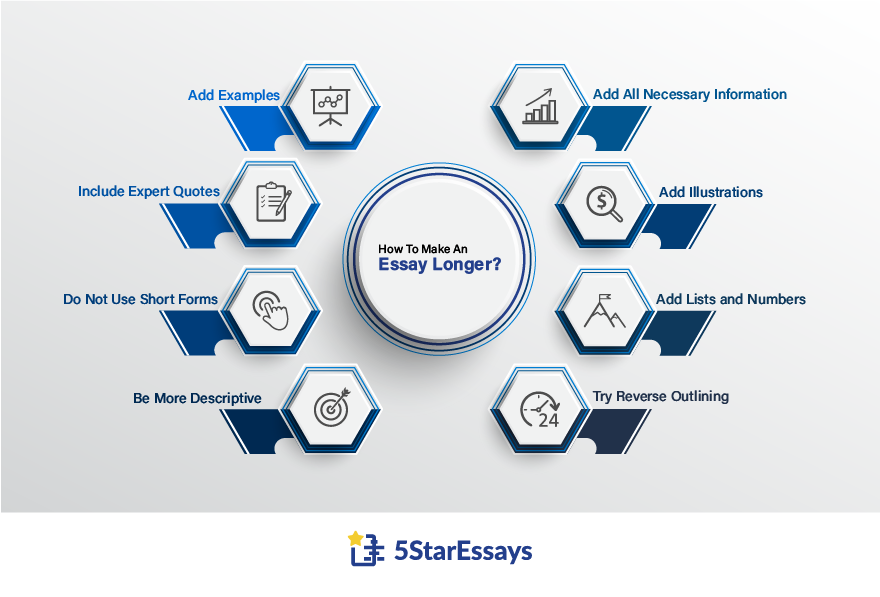
Do a Comprehensive Research
Conducting in-depth research is crucial when aiming to make your essay longer and more comprehensive.
By going beyond surface-level knowledge, you gain access to a wealth of information and insights.
This additional research allows you to develop a deeper understanding of your topic, which in turn enhances the quality of your essay.
When conducting research, keep in mind to rely on credible sources. Credible sources include academic journals, reputable books, scholarly databases, and trusted websites.
Elaborate on Arguments
To expand and strengthen your essay, it is vital to provide detailed explanations and expand on your arguments. Follow these key steps:
- Offer clear explanations of your main points, using descriptive language to enhance understanding.
- Support your arguments with relevant evidence, such as data, statistics, or expert opinions.
- Provide examples and illustrations that exemplify your points and make them more relatable.
- Engage in critical analysis and interpretation to showcase a deeper understanding of the topic.
- Address counterarguments by acknowledging opposing viewpoints and providing reasoned responses.
- Continuously connect your elaborations back to the thesis statement for a focused and cohesive essay.
Add Examples
Start by researching your topic. Make sure you get important details, substantial arguments, and evidence to highlight your points of view better.
When you start writing, look for the claims you’ve made in your essay and analyze the supporting and opposing views.
Make sure you add relevant supporting evidence for each view that makes your essay more engaging and lengthen your paper effectively.
Usually, it’s good to use case studies and real-life scenarios or statistical information to make your arguments stronger.
Whenever you use any mathematical figures try to spell out numbers. Make sure that whatever it is, they support your arguments strongly.
Use Quotations and Citations
Using quotations from experts and credible sources serves multiple purposes in your essay.
Quotations play a significant role in enhancing the understanding and depth of your essay.
They demonstrate that your ideas are supported by established thinkers or recognized sources in the field.
Proper citation is essential when using quotations in your essay. It not only gives credit to the original author but also demonstrates your academic integrity.
Ensure that you adhere to the required citation style , whether it's APA, MLA, Chicago, or any other specified format.
Take the time to understand the rules and guidelines for citing quotations accurately.
Include Transitional Phrases and Sentences
Thinkin how to make your essay longer using words while maintaining a smooth flow and coherence?
It is essential to include transitional phrases and sentences in your essay.
Transitional sentences not only help to make your essay longer but more cohesive as well. Transition sentences are used to connect the ideas being discussed in different paragraphs of the essay. So the right choice of transitional sentences will make your essay a great piece of writing.
Here are some key considerations for using transitional phrases effectively:
Introducing Additional Points:
- Furthermore,
- Additionally,
- In addition to,
Providing Examples or Illustrations:
- For instance,
- For example,
- Specifically,
- To illustrate this,
- In particular,
Need more examples of transitional words to make an essay longer? Check out this transition words blog!
Do Not Use Short Forms
Avoid using short forms and contractions. In a formal essay, do not use ‘wouldn't’, ‘can’t’ or ‘don’ts’, use their full form. The same goes for numbers also, use spellings instead of number form.
If you are not sure about the word count then use a word counter to be sure that you have added the required number of words. Increasing the font size will also help to lengthen your essay.

Paper Due? Why Suffer? That's our Job!
Be More Descriptive
To make your essay longer while keeping the flow smooth and engaging the reader, it is essential to focus on being more descriptive in your writing.
By incorporating vivid descriptions, sensory details, and figurative language, you can expand the length of your essay while enhancing its depth and richness.
Descriptive language allows you to provide more intricate explanations, paint a more detailed picture of your subject matter, and create a more immersive reading experience.
By employing techniques such as engaging the senses, providing concrete examples, and painting a vivid picture with words, you can reach the required word count.
Add All Necessary Information
During your revision part, ensure that you’ve included all relevant information for the essay and there’s no missing concept or theory.
At times students find sections that can be improved with new arguments or there is a missing piece of evidence.
Look for such loopholes in the content and fix them.
Add details that are relevant, credible, and valuable for your audience as well. Once you’re done with the checking, re-read the essay to ensure complete conformity to quality standards and essay guidelines.
Format Your Paragraphs Well
While writing your essay make sure that paragraphs of your essay are formatted well.
Each paragraph should start with a topic sentence , following the supporting argument, and a concluding or transition sentence.
Keep revising your paragraphs and add the sentences that are missing.
Take a Fresh Look at Your Topic
This may seem a useless tactic but revisiting your prompt in the middle of your writing process will help you a lot to explore the hidden perspectives of the topic.
You may realize that you have not considered a number of dimensions of the topic nor explained them.
This allows you to gain new perspectives, refine your arguments, and ensure that your essay remains relevant and compelling.
Their explanation will not only help you elongate your essay but also make it more comprehensive.
Add Illustrations
To further add to your essay content, look for illustrative material that can be included to justify your claims better.
These are usually supporting pieces of information like images, charts, statistical reports, and graphs that largely add to the essay's appeal and length as well.
Your sources must be authentic and reliable. Do not forget to include them in your resource list to increase the size and essay length.
Add Lists and Numbers
Another good tip that adds to the page count for your paper is the addition of bullets and lists to organize your ideas properly.
Besides, they also make the paper longer and more readable, and engaging for the audience. Within sections and paragraphs, add lists to further explain a core concept or idea better.
You can also increase the line spacing between texts to make your essay look longer.
Tough Essay Due? Hire Tough Writers!
Try Reverse Outlining
After writing your paper, reading back through it and creating an outline will help you reorganize pages. It will make more sense to the readers about your work. It can also point out areas that you need to develop more.
If you see a point and think that you can clarify it more, take the opportunity and make it longer.
If you notice a paragraph that introduces more than one idea, break them into multiple paragraphs and explain them thoroughly.
Take a Break and Revisit Your Essay
To increase the length and improve the quality of your essay, it is essential to take breaks and revisit your work with a fresh perspective.
Stepping away from your writing allows you to clear your mind and return with renewed focus.
When you review your essay with fresh eyes, you can identify areas that need further development, clarification, or expansion.
Take the time to revise and edit your essay, addressing grammar, punctuation, and clarity.
Approach your Instructor and Ask for Possible Help
Many teachers and instructors are willing to give reviews about the paper before submission. It means you can always consider approaching your instructor for guidance.
Schedule a meeting and come prepared with specific questions about expanding your essay effectively.
Explain your concerns about the length and express your willingness to put in the effort to improve.
Be attentive to the advice given by your instructor and make a keen effort to implement their feedback in your revised essay.
Make Your Spacing Larger
One sneaky way to increase the length of your essay is by adjusting the spacing.
Increase the line spacing between your lines of text by using 1.5 or double spacing instead of the default 1.0 spacing.
Another option is to use a slightly larger font size, although it's important not to go overboard. For example, you are using times new roman size 12, make it to 12.5!
Incorporating subheadings within your essay can help break up sections and add length. Additionally, take the opportunity to provide more detailed explanations and elaborate on your examples.
Remember to use these formatting tips responsibly and focus on providing meaningful content to enhance the overall quality of your essay.
Get Professional Writing Help
If you find yourself still struggling to increase the length and improve the quality of your essay, seeking professional writing help can be a valuable option.
These online writing services offer assistance from experienced writers who can help you with essay-lengthening techniques. They also offer suggestions for improvement and provide editing and proofreading services.
Just like that, 5StarEssays.com is one of the best “ write my essay ” services!
Our qualified writing experts can compose an impressive essay that meets the word count without giving the impression of dragging it.
Don't miss out on the opportunity to elevate your writing skills and achieve your academic goals.

Marketing, Law
As a Digital Content Strategist, Nova Allison has eight years of experience in writing both technical and scientific content. With a focus on developing online content plans that engage audiences, Nova strives to write pieces that are not only informative but captivating as well.
Was This Blog Helpful?
Keep reading.
- How to Write an Essay - A Complete Guide with Examples

- The Art of Effective Writing: Thesis Statements Examples and Tips

- Writing a 500 Word Essay - Easy Guide

- What is a Topic Sentence - An Easy Guide with Writing Steps & Examples

- A Complete Essay Outline - Guidelines and Format

- 220 Best Transition Words for Essays

- Essay Format: Detailed Writing Tips & Examples

- How to Write a Conclusion - Examples & Tips

- Essay Topics: 100+ Best Essay Topics for your Guidance

- How to Title an Essay: A Step-by-Step Guide for Effective Titles

- How to Write a Perfect 1000 Word Essay

- Learn How to Start an Essay Effectively with Easy Guidelines

- Types of Sentences With Examples

- Hook Examples: How to Start Your Essay Effectively

- Essay Writing Tips - Essential Do’s and Don’ts to Craft Better Essays

- How To Write A Thesis Statement - A Step by Step Guide

- Art Topics - 200+ Brilliant Ideas to Begin With

- Writing Conventions and Tips for College Students

People Also Read
- creative essay writers
- expository essay outline
- 500 word essay
- autobiography format
- impromptu speech topics
Burdened With Assignments?

Advertisement
- Homework Services: Essay Topics Generator
© 2024 - All rights reserved
Home / Guides / Writing Guides / Writing Tips / How to Make an Essay Longer the Smart Way
How to Make an Essay Longer the Smart Way
Meeting an essay’s required page or word count can sometimes be a struggle, especially if you’re juggling multiple papers or exams. In a pinch, students often rely on tricks like increasing margin size or making their font slightly bigger. Though these tricks do increase page length, there are easier (and smarter) ways to write a longer, high-quality essay. Making a paper meet minimum word or page counts doesn’t have to be an agonizing process—you can add length while also adding clarity and depth.
Here are 10 tips on how you can write a longer and a smarter essay, even if the deadline is fast approaching:
Tip #1: Look Back at Your Prompt/Rubric/etc.
If you’ve been provided a comprehensive prompt or rubric for an essay, read it, and read it again. Think about the following:
- Did you answer all of the questions in the prompt?
- Did you provide supporting evidence to back up whatever claims you made?
- Did you leave out any information that might increase the reader’s understanding of your argument?
- Did you meet all requirements (besides length) for the paper?
If the answer isn’t a decisive “yes” to every question on this list, go back and revise.
Tip #2: Go Back Through Your Introduction and Conclusion
Often times, ideas evolve while writing a paper. If the first thing you wrote was the introduction, go back and reread the first paragraph. You might decide that you left out key information that aids the reader in understanding your argument. When looking back on the conclusion, make sure you’ve both summarized the main points within the essay and provided your reader with a solution to consider. If you don’t feel you’ve done this, go back through and revise the paper.
Tip #3: Have Someone Proofread Your Essay
Even if you’re short on time ask a friend, sibling, or parent to read through your paper, specifically noting any points they find confusing. Then, go back and revise the parts that were unclear, adding in more information to provide readers with further clarity. You have a more comprehensive understanding of what you’re writing about than your reader, so having someone else look over your paper can be a helpful way to ensure that you haven’t missed any important details.
Tip #4: Use Quotations
Chances are, you have already used quotes in your paper. Quotations are a great way to enhance your argument while also driving up a paper’s word count, but don’t add quotes just for the sake of doing so. If you’re short on words, read through your source materials again to see if you’ve missed any valuable quotes. You can also do a little more research to see if there are any other sources you can add to provide the reader with more evidence toward your argument. Longer quotes aren’t necessarily better, but if you’re really in a bind, you might want to lengthen some of the quotes that are already included.
Tip #5: Review Your Outline
Did you make an outline to plan the essay when you first started? Go back through that initial outline and make sure you’ve hit all of your intended points. It’s possible that you’ve left out an important piece of your argument that would both increase page count and make for a better essay.
Tip #6: Include More Transitional Phrases
Graders often look for traditional words linking sentences to each other, like “therefore,” “even though”, and “on the other hand.” Read through your essay and make sure the sentences flow smoothly into each other. If they don’t, go back and add in transitional phrases like the ones listed above. Your writing will be easier to read, and you’ll get closer to the minimum page requirement in the process.
Tip #7: Read Your Paper Out Loud
This might sound like a silly tip, but when you read your paper out loud, you become increasingly aware of any grammatical or syntactical issues. When you rephrase sentences to fix these, you might end up increasing the paper length a bit. In the process of reading out loud, you also might realize that you didn’t include sufficient details within a particular paragraph. If that’s the case, go back in and add more to increase length.
Tip #8: Take a Break From Your Essay
You’ve probably been staring at your computer screen for hours, hoping words will magically pop into your head. Take a break. Eat a snack, go for a walk, or talk to a friend on the phone. You’ll come back to the essay with a fresh perspective after some time away, and you might have new ideas after you’ve had time away from your paper.
Tip #9: Ask Your Instructor for Help
Most teachers, teaching assistants, and professors are willing to look over papers for students before the final submission date. If there is still time, ask if you can make an appointment to go over your paper or head over to office hours. Your instructor might offer tips on how to better answer the prompt, and this in turn may also increase the word count of the paper.
Tip #10: Use multiple examples to back up your argument
If you’ve only used one source or anecdote to explain a given point, find a second source to provide additional evidence for the reader. This method will help drive up a paper’s word count while also providing further support for your argument.
Although hitting a minimum page count can sometimes be challenging, you can do it the smart way by increasing the information you provide to the reader—there’s no reason to resort to tricks like increasing line spacing or font size. If you’re really in a bind at the last minute, you might want to break up some of your paragraphs. This increases length while also making text more manageable for a reader. But after going through the tips on this list, your paper should be adequate in length without you having to even consider spacing.
EasyBib Writing Resources
Writing a paper.
- Academic Essay
- Argumentative Essay
- College Admissions Essay
- Expository Essay
- Persuasive Essay
- Research Paper
- Thesis Statement
- Writing a Conclusion
- Writing an Introduction
- Writing an Outline
- Writing a Summary
EasyBib Plus Features
- Citation Generator
- Essay Checker
- Expert Check Proofreader
- Grammar Checker
- Paraphrasing Tools
Plagiarism Checker
- Spell Checker
How useful was this post?
Click on a star to rate it!
We are sorry that this post was not useful for you!
Let us improve this post!
Tell us how we can improve this post?
Grammar and Plagiarism Checkers
Grammar Basics
Plagiarism Basics
Writing Basics
Upload a paper to check for plagiarism against billions of sources and get advanced writing suggestions for clarity and style.
Get Started
- PRO Courses Guides New Tech Help Pro Expert Videos About wikiHow Pro Upgrade Sign In
- EDIT Edit this Article
- EXPLORE Tech Help Pro About Us Random Article Quizzes Request a New Article Community Dashboard This Or That Game Popular Categories Arts and Entertainment Artwork Books Movies Computers and Electronics Computers Phone Skills Technology Hacks Health Men's Health Mental Health Women's Health Relationships Dating Love Relationship Issues Hobbies and Crafts Crafts Drawing Games Education & Communication Communication Skills Personal Development Studying Personal Care and Style Fashion Hair Care Personal Hygiene Youth Personal Care School Stuff Dating All Categories Arts and Entertainment Finance and Business Home and Garden Relationship Quizzes Cars & Other Vehicles Food and Entertaining Personal Care and Style Sports and Fitness Computers and Electronics Health Pets and Animals Travel Education & Communication Hobbies and Crafts Philosophy and Religion Work World Family Life Holidays and Traditions Relationships Youth
- Browse Articles
- Learn Something New
- Quizzes Hot
- This Or That Game
- Train Your Brain
- Explore More
- Support wikiHow
- About wikiHow
- Log in / Sign up
- Education and Communications
- College University and Postgraduate
- Academic Writing
How to Make an Essay Appear Longer Than It Is
Last Updated: February 2, 2024 Fact Checked
This article was co-authored by Jake Adams . Jake Adams is an academic tutor and the owner of Simplifi EDU, a Santa Monica, California based online tutoring business offering learning resources and online tutors for academic subjects K-College, SAT & ACT prep, and college admissions applications. With over 14 years of professional tutoring experience, Jake is dedicated to providing his clients the very best online tutoring experience and access to a network of excellent undergraduate and graduate-level tutors from top colleges all over the nation. Jake holds a BS in International Business and Marketing from Pepperdine University. There are 7 references cited in this article, which can be found at the bottom of the page. This article has been fact-checked, ensuring the accuracy of any cited facts and confirming the authority of its sources. This article has been viewed 1,778,151 times.
You are writing a paper and the deadline is approaching, but you are nowhere near the page limit. Many students find themselves in this position. Luckily for you, you can lengthen your paper by using a few tricks. Increasing the font size, adding a lengthy header, and manipulating the spacing between lines are just a few strategies you can use to make your essay appear longer. However, be aware that breaking your teacher’s guidelines may result in a lower grade.
Playing with the Font

- Don’t pick a very large font like Arial Black or Lucida Handwriting. Your teacher will notice that you are trying to make your essay longer by choosing a larger font.

Manipulating Spacing and Margins

- If the increase is too noticeable, then try 1.15 or 1.1 instead.
- Because all documents are left justified, avoid increasing the left margin. Adjusting the left margin will produce a noticeable change that your teacher will detect.

Adjusting the Header and Footer

Expanding the Content

- Additionally, if you are quoting or paraphrasing research or literature, make sure to cite it properly. Citations can add extra length to a paper as well.

- Expand your introductory paragraph with an attention-getting statement to hook the reader in.

- However, try to avoid being descriptive when it is unnecessary since this may cause your paper to appear embellished or sound verbose.

Community Q&A
- Copy and paste your paper into a new document. Make these changes to the new document. Then compare and contrast the document with the changes to the original document. Remove any adjustments that seem obvious. Thanks Helpful 0 Not Helpful 0
- Use a thesaurus to find longer synonyms to use in place of shorter ones. Thanks Helpful 0 Not Helpful 0
- Spell out abbreviations; for example, write out “United States" instead of using "US." Thanks Helpful 0 Not Helpful 0

- Be aware that breaking your teacher’s guidelines may be considered cheating, which may result in a lower grade or even a zero. Thanks Helpful 12 Not Helpful 1
- Don't be redundant. Thanks Helpful 5 Not Helpful 1
You Might Also Like

- ↑ https://www.paperhelp.org/blog/how-to-make-a-paper-longer.html
- ↑ https://www.jakebinstein.com/blog/how-to-make-an-essay-look-longer/
- ↑ https://studentshare.org/study-guides/how-to-make-your-essay-look-longer
- ↑ http://www.seventeen.com/life/school/advice/a27491/tricks-you-try-to-make-your-school-paper-longer/
- ↑ https://www.thoughtco.com/how-to-make-paper-longer-793288
About This Article

To make an essay appear longer than it is, pick a font that's slightly larger than Times New Roman, like Arial, Courier New, or Cambria. If you're required to use 12-point font, try increase the font to 12.1 or 12.2 to gain some extra length without the font looking noticeably larger. Then, press on Control and the F key at the same time to activate the find and replace function, and replace all of the commas and periods with 14-point font. If the essay still isn't long enough, increase the line spacing by 0.1 or 0.2 and make the right margin 0.1-0.2 inches larger. For tips on adjusting the header and footer or adding more content to your essay, read on! Did this summary help you? Yes No
- Send fan mail to authors
Reader Success Stories
Grace Baker
Nov 19, 2018
Did this article help you?

Dec 7, 2017
Lucan Wrigley
May 22, 2017
Susan Smith
Aug 10, 2016
May 27, 2017

Featured Articles

Trending Articles

Watch Articles

- Terms of Use
- Privacy Policy
- Do Not Sell or Share My Info
- Not Selling Info
Don’t miss out! Sign up for
wikiHow’s newsletter
- Link to facebook
- Link to linkedin
- Link to twitter
- Link to youtube
- Writing Tips
How to Make an Essay Longer
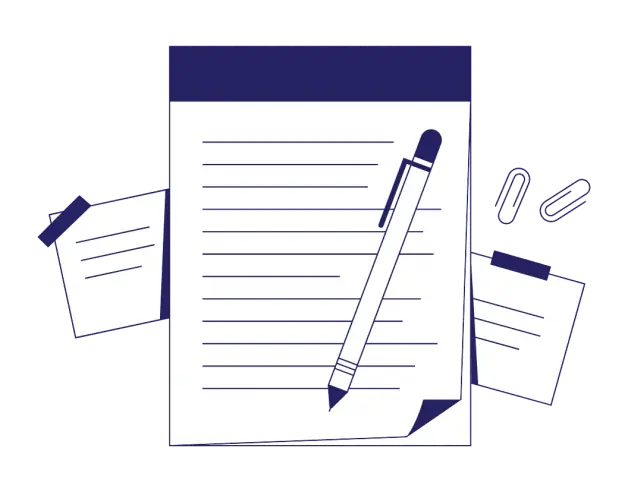
7-minute read
- 10th May 2023
So you have an essay due the next day. You’ve been holed up in your dorm all day writing it, and now you’ve finished the conclusion. You shake your fist in celebratory fashion as you punctuate the paper’s last sentence. However, your jaw drops in horror when you focus on the word count. The essay rubric states that you must write at least 1,500 words, but you’ve written only 1,000 ! How can this be? You worked so hard to do what the assignment asked you. We know the feeling, and we’re sure every college student experiences it at least once.
So with time running out, you can do the following:
● Submit the essay and hope the professor doesn’t notice
● Add some gibberish sentences to get close enough to the required word count
We don’t recommend these options. Making an essay longer seems daunting, but it doesn’t have to be. That’s why we’re providing this post on expanding your essay while keeping it relevant to the topic. We’ll share our helpful tips, and by the end of the post, you’ll know what to do next time your essay falls short of the word count.
1. Add Content to the Essay
Adding more details is a great starting point for increasing the word count. Review your essay and see whether you should have addressed additional points about the topic. Could you include a few more arguments?
You’ll likely have to review your sources to find additional claims. We understand that you might not want to do this, especially if the clock reads midnight and your class starts in nine hours. However, adding more content not only increases the word count; it also makes your essay more credible.
If you need to add content, make sure it’s relevant to the topic. Consider the following example:
Personal details about the source’s author are irrelevant. Submitting such details will only earn you the wrath of your professor’s red ink. Let’s try an alternative:
Expanding on the citation with personal insight about screen time adds punch while keeping the discussion relevant. Additional details must move your essay forward the way dialogue and narrative do for a work of fiction.
2. Add Transitional Sentences and Phrases
Your essay might be short of words because it lacks transitional phrases, so you should add some to the mix. In fact, every academic paper should include a healthy blend of transitional sentences and transitional words/phrases . Not sure what we mean by that? You know words and phrases such as however , moreover , and in addition .
As with details, transitional phrases help to move the essay forward, so make sure to use them correctly. Let’s take an example from an essay about the late Serbian president Slobodan Milosevic:
As you can see, the writer uses transitional phrases correctly, adding value and words to the essay. When you use them correctly, transitional sentences and phrases improve the flow of your writing , enhancing readability. Professors expect coherent essays that flow smoothly, so transitional sentences and phrases are mandatory, regardless of word count.
That being said, it can be easy to overuse linking words, particularly if you’re a non-native writer. Check out this interesting article from Fabio Cerpeloni, who argues that linking words can impact the readability of your text .
3. Spell Out Words and Numbers
If you have contractions in your essay, such as can’t , won’t , and couldn’t , write them out in full. You shouldn’t use contractions at all in academic writing because they’re considered informal. Although using full versions of words seems to be a miniscule measure, doing so can go a long way to increasing your word count. And as a rule, you can also spell out numbers one through eleven. Again, doing this will help expand your essay.
Find this useful?
Subscribe to our newsletter and get writing tips from our editors straight to your inbox.
To save time switching out your contractions, make sure you’re familiar with Microsoft Word’s find and replace tool .
4. Add More Examples
Using at least two examples, you should aim to support every argument you present. If you have only one example for an argument, add a couple more. Provide citations to support your claims; otherwise, your professor will question your knowledge. As with details, examples will strengthen your essay. It’s a win–win situation!
If the essay has enough citations but still needs more words, you could try paraphrasing claims from sources. Just be sure to paraphrase effectively . You wouldn’t want to fall into the trap of plagiarism!
5. Review the Introduction and Conclusion
Now that you’ve written the essay, go back to the introduction and the conclusion. You might be able to expand on them and provide extra details. Remember that the introduction serves as a lead-in to the essay. In other words, it captures your readers’ attention and makes them want to keep reading. If your introduction appears weak, add details that will engage the reader properly.
And for the conclusion, provide a takeaway for the reader and offer a call to action. For example, what are the most important things to remember about your essay? The conclusion may lack punch, so add some details to improve it.
6. Expand Your Research on the Topic
The amount of research you’ve done could affect the word count. One way to check this is by reviewing your reference list. It should have at least five sources, so if yours has fewer, you need to do more research. Again, it’s not something you’d like to do in the middle of the night; however, sacrifices must be made if your essay needs more research. We guarantee your professor will notice if you haven’t done enough research. Here’s an extra tip: adding details will be much easier if you’re fully knowledgeable about the topic. Trust us on this!
While making an essay longer may seem daunting, doing so is easier if you’ve adequately researched the topic. The essay likely needs more ideas or examples, so go ahead and add them. Additional details will lend value, improve flow, and make your essay more credible. The most important thing to remember is that any details you add must be relevant. Simply adding fluff will weaken your essay and cost you marks. So never submit an essay with a low word count; your professor will notice! And after all, expanding on an essay is part of mastering essay writing skills .
We recommend not waiting until the last minute to check that your essay meets the required word count. Adding details or doing additional research the night before will only spell trouble. We understand the difficulty of making time when multiple papers are due in the same week. However, college life will test your time management skills like nothing else! Use your time wisely!
1. Why do essays fall short of the required word count?
This is often due to a lack of details and transitional sentences. Review your essay to see whether it’s missing important examples that can strengthen your claims.
2. Can I simply add “fluff” to increase the word count?
Anything you add to the essay must be relevant and must add value. Your professor is no fool, after all!
3. I hear proofreading is essential before submitting my essay. Can anyone help me with this?
We suggest our proofreading experts at Proofed! They can check your writing for grammar and punctuation errors and ensure perfect spelling and concision. Consider submitting a 500-word document for free today!
Share this article:
Post A New Comment
Got content that needs a quick turnaround? Let us polish your work. Explore our editorial business services.
9-minute read
How to Use Infographics to Boost Your Presentation
Is your content getting noticed? Capturing and maintaining an audience’s attention is a challenge when...
8-minute read
Why Interactive PDFs Are Better for Engagement
Are you looking to enhance engagement and captivate your audience through your professional documents? Interactive...
Seven Key Strategies for Voice Search Optimization
Voice search optimization is rapidly shaping the digital landscape, requiring content professionals to adapt their...
4-minute read
Five Creative Ways to Showcase Your Digital Portfolio
Are you a creative freelancer looking to make a lasting impression on potential clients or...
How to Ace Slack Messaging for Contractors and Freelancers
Effective professional communication is an important skill for contractors and freelancers navigating remote work environments....
3-minute read
How to Insert a Text Box in a Google Doc
Google Docs is a powerful collaborative tool, and mastering its features can significantly enhance your...

Make sure your writing is the best it can be with our expert English proofreading and editing.
.png)
How To Make An Essay Longer

To make an essay longer, focus on quality: elaborate on arguments, add evidence, consider counterarguments, deepen analysis, and clarify points. Use examples, expand introductions and conclusions, and enhance transitions for better flow and comprehension.
Struggling with an essay that just won't stretch to the required length? You're not alone.Studyfy is your ally in this common academic predicament.
Most students have experienced looking at their word count and thinking about how to reach the maximum limit without using filler content. This guide tackles that problem head-on with practical solutions and insights.
We’ll introduce you to plenty of useful techniques so you can increase your word count effortlessly and without compromising your essay’s quality.
How To Make Your Essay Longer With In-Depth Research
One of the first approaches you can use to make your essay longer is to research your points. Remember these pointers:
- Conduct meticulous and thorough research on your essay’s topic to find new and overlooked information and insights.
- Make sure you use insights that strengthen your argument further, and not just information to use as filler and is irrelevant.
Dig a little deeper, and you’ll surely find something you might have overlooked and can add to your paper.
Ways To Make Your Essay Longer With Elaboration
Another way to make your essay longer is to elaborate more. This means you should explore the points you argue in greater detail. Keep these tips in mind:
- Break down your arguments : Detail each of your arguments and break them down into sub-points. For example, if you’re writing about sustainable energies, you can elaborate on the different types of sustainable energy sources that exist.
- The power of descriptive language : By using descriptive language, you can lengthen your essay because you’re painting a more vivid picture of your topic. You’re adding more detail and nuance.
- Use real-world examples : These can help add substance, and they will strengthen the validity of your argument.
- Add background information : When adding new arguments to a topic, you can easily provide background information on whatever it is you want to add. This will help make your essay longer but can also add context, which will help the reader understand your point better.
- Use anecdotes : If done right and added in the right places, sharing personal stories can make your essay better.
Using Counter Arguments In Your Essay
You can make an essay longer by using counterarguments. This strategy not only elongates your word count, it has the potential to increase your essay’s quality and persuasiveness.
Consider the following:
- Find popular counter-views: Find common counterarguments against your thesis statement. If you know them, you’ll be better equipped to deconstruct and counter them to a larger paper's word count.
- Show the strength of your view : Properly, you can introduce the strength of your perspective through the counterargument. For example, use strong evidence to oppose the view and then show why your stance deserves to be considered.
Using Quotations and Analysis
If you’re looking for other ways how to make a paper longer, you can use quotes. Quotations and further analysis is a great strategy to add more content to your essay. So, how exactly can you achieve this? Check these pointers out:
- Choose relevant quotes : Of course, you’ll have to select quotations and transition words that are related to your topic. You want quotes that capture the core ideas of your argument. If you’re writing about the environment, you’d want to quote an expert environmentalist and so on.
- Give analysis on your quotes : When you’ve presented a quotation, try providing analysis on it. Discuss its meaning and implications, and demonstrate why it backs up your claims.
Are you struggling with essay writing?
Get your assignments done by real pros. Save your precious time and boost your marks with ease.
A Blueprint For A Longer Essay
Another way to tackle how to lengthen an essay's word count is to make a detailed outline before writing so you can plan the number of words you’ll be writing from the start. This will motivate and reassure you that you’re hitting the word count.
Seek Writing Help
Finding writing assistance from professionals can be an easy and effective strategy to make your essay longer. For example, you can send a “ do my essay ” request on Studyfy to get in touch with a professional writer at any time. Here are some tips to remember when seeking help.
- Look for credibility : Be sure you’re getting writing help from reputable people. Take a look at their customer feedback and reputation to make sure they deliver what they promise.
- Be clear with what you need : Make sure they know that you want a longer essay. Be clear with your instructions.
- Guidance, not plagiarism : Use professional help for assistance, professional insights, and inspiration. You should use their work as a reference and foundation to build your writing and reach that desired word count.
- Make use of expert feedback : Make sure you use the feedback that is given to you and practice it.
If you don’t have much time or energy, turning to writing professionals can be a great deal of help at desperate times of trying to fill out the minimum page count.
Using Complex Sentence Structures and Richer Vocabulary to Up Your Required Word Count
Another strategy you can use if you’re keen on knowing how to make your essays longer is enriching your essay with vocabulary and complex sentence structures. What does this mean? Check out these tips:
- Employ varied language and use synonyms : You can avoid repeating your words by using synonyms to convey similar phrases and meanings. This will add length and keep your audience engaged. With that, try utilizing transition words, transitional phrases and relevant quotations to reach supporting evidence.
- Use complex sentences : By using complex sentences and clauses in your writing, you can add more nuance to your writing and you can convey more insights. Vary your sentences from short to more detailed and lengthy. Balance this out with easy readability. Make sure that your essay is still easy to understand, regardless of a more nuanced writing style.
Taking Advantage of Examples and Case Studies when Essay Writing
If you want more words to make your essay longer, then using examples and case studies and integrating them into your essay is a great strategy to reach your word count goal.
These can strengthen your argument since they provide tangible evidence. They don’t solely make your essay longer. Here’s what you need to remember:
- Select relevant examples and case studies : You should, of course, use examples that back up your arguments. Make sure they are recent examples as well. Imagine yourself writing on technology. If you’re using an example, you should use one from recent years.
- Go into detail when demonstrating case studies : When you use a case study, you should go into detail and include the context, process, and outcomes. You will add length to your essay, but you will also simultaneously make it more nuanced and strengthen your points.
Using Visual Elements
If done effectively, you can make your writing more engaging. Still confused? Don’t forget you can pay for essay services on Studyfy right now for an extra hand. So, what can you use?
You can use graphs, charts, and even image s to strengthen your essay and make it longer. For example, when you’re finishing up a scientific essay, you can use graphs to showcase statistics and data.
Writing Detailed Intros and Conclusions
Since your introduction and conclusion are decisive elements in your essay, you can make do by increasing their length without compromising their strength and quality. Do keep these tips in mind:
- For the introduction : Provide more context so that you can present your thesis in a stronger light. Write hints about what you’ll discuss in your body text.
- For the conclusion : To make your conclusion longer, you can elaborate on the arguments you’ve developed over the body. You should present a “developed” and concluding version of those arguments. Reflect on what you’ve written without introducing new information. You can create a detailed and persuasive call to action to invite readers to explore the topic more.
Development
Make sure your sections are well organized, and every argument is fully developed. If they’re not, this might explain why you’re not reaching your word count limit. Need extra help? Don’t forget to take advantage of Studyfy’s custom writing service right now. Elaborate a point completely. Be meticulous and diligent with the development of your points.
Did you like our article?
For more help, tap into our pool of professional writers and get expert essay writing services!
Can you teach me how to make my essay longer without sacrificing quality?
Make sure that your points strengthen your arguments. Elaborate carefully. If you need help, use our college admission essay writing service for expert writing help.
Does this guide include everything I need to know?
Yes. Use our table of contents to jump to the techniques you feel keen on using. You'll find everything you need to know on how to make paper longer. We offer key points, supporting evidence and more examples to help you achieve the desired essay length.
How do I make my essay longer and keep it coherent?
You can make an essay longer and maintain its focus by going back to your thesis statement and main arguments when adding new material. Make sure they strengthen your arguments.
What should I avoid doing?
When finding ways how to make your paper longer, avoid using filler content, and don't repeat words and sentences.
Featured Posts
How to write a term paper.
.png)
How to Write a Dissertation

How to Write an Essay

How to Write a Research Paper
.png)
How to Write a Discussion Post

How to Write a Lab Report

What are your chances of acceptance?
Calculate for all schools, your chance of acceptance.
Your chancing factors
Extracurriculars.
How to Write a Strong Thesis Statement: 4 Steps + Examples

What’s Covered:
What is the purpose of a thesis statement, writing a good thesis statement: 4 steps, common pitfalls to avoid, where to get your essay edited for free.
When you set out to write an essay, there has to be some kind of point to it, right? Otherwise, your essay would just be a big jumble of word salad that makes absolutely no sense. An essay needs a central point that ties into everything else. That main point is called a thesis statement, and it’s the core of any essay or research paper.
You may hear about Master degree candidates writing a thesis, and that is an entire paper–not to be confused with the thesis statement, which is typically one sentence that contains your paper’s focus.
Read on to learn more about thesis statements and how to write them. We’ve also included some solid examples for you to reference.
Typically the last sentence of your introductory paragraph, the thesis statement serves as the roadmap for your essay. When your reader gets to the thesis statement, they should have a clear outline of your main point, as well as the information you’ll be presenting in order to either prove or support your point.
The thesis statement should not be confused for a topic sentence , which is the first sentence of every paragraph in your essay. If you need help writing topic sentences, numerous resources are available. Topic sentences should go along with your thesis statement, though.
Since the thesis statement is the most important sentence of your entire essay or paper, it’s imperative that you get this part right. Otherwise, your paper will not have a good flow and will seem disjointed. That’s why it’s vital not to rush through developing one. It’s a methodical process with steps that you need to follow in order to create the best thesis statement possible.
Step 1: Decide what kind of paper you’re writing
When you’re assigned an essay, there are several different types you may get. Argumentative essays are designed to get the reader to agree with you on a topic. Informative or expository essays present information to the reader. Analytical essays offer up a point and then expand on it by analyzing relevant information. Thesis statements can look and sound different based on the type of paper you’re writing. For example:
- Argumentative: The United States needs a viable third political party to decrease bipartisanship, increase options, and help reduce corruption in government.
- Informative: The Libertarian party has thrown off elections before by gaining enough support in states to get on the ballot and by taking away crucial votes from candidates.
- Analytical: An analysis of past presidential elections shows that while third party votes may have been the minority, they did affect the outcome of the elections in 2020, 2016, and beyond.
Step 2: Figure out what point you want to make
Once you know what type of paper you’re writing, you then need to figure out the point you want to make with your thesis statement, and subsequently, your paper. In other words, you need to decide to answer a question about something, such as:
- What impact did reality TV have on American society?
- How has the musical Hamilton affected perception of American history?
- Why do I want to major in [chosen major here]?
If you have an argumentative essay, then you will be writing about an opinion. To make it easier, you may want to choose an opinion that you feel passionate about so that you’re writing about something that interests you. For example, if you have an interest in preserving the environment, you may want to choose a topic that relates to that.
If you’re writing your college essay and they ask why you want to attend that school, you may want to have a main point and back it up with information, something along the lines of:
“Attending Harvard University would benefit me both academically and professionally, as it would give me a strong knowledge base upon which to build my career, develop my network, and hopefully give me an advantage in my chosen field.”
Step 3: Determine what information you’ll use to back up your point
Once you have the point you want to make, you need to figure out how you plan to back it up throughout the rest of your essay. Without this information, it will be hard to either prove or argue the main point of your thesis statement. If you decide to write about the Hamilton example, you may decide to address any falsehoods that the writer put into the musical, such as:
“The musical Hamilton, while accurate in many ways, leaves out key parts of American history, presents a nationalist view of founding fathers, and downplays the racism of the times.”
Once you’ve written your initial working thesis statement, you’ll then need to get information to back that up. For example, the musical completely leaves out Benjamin Franklin, portrays the founding fathers in a nationalist way that is too complimentary, and shows Hamilton as a staunch abolitionist despite the fact that his family likely did own slaves.
Step 4: Revise and refine your thesis statement before you start writing
Read through your thesis statement several times before you begin to compose your full essay. You need to make sure the statement is ironclad, since it is the foundation of the entire paper. Edit it or have a peer review it for you to make sure everything makes sense and that you feel like you can truly write a paper on the topic. Once you’ve done that, you can then begin writing your paper.
When writing a thesis statement, there are some common pitfalls you should avoid so that your paper can be as solid as possible. Make sure you always edit the thesis statement before you do anything else. You also want to ensure that the thesis statement is clear and concise. Don’t make your reader hunt for your point. Finally, put your thesis statement at the end of the first paragraph and have your introduction flow toward that statement. Your reader will expect to find your statement in its traditional spot.
If you’re having trouble getting started, or need some guidance on your essay, there are tools available that can help you. CollegeVine offers a free peer essay review tool where one of your peers can read through your essay and provide you with valuable feedback. Getting essay feedback from a peer can help you wow your instructor or college admissions officer with an impactful essay that effectively illustrates your point.

Related CollegeVine Blog Posts

- Free Essay Examples
30+ Tips and Tricks to Make Your Essays Longer
How to make an essay longer (30+ useful tips and tricks).
Writing an essay with a minimum word count can be a challenging task, particularly when you've exhausted all your ideas and arguments. However, fear not!
In this article, we will explore over 30 useful tips and tricks to help you make your essay longer while maintaining quality and coherence. So, let's dive right in:
1. Expand your Introduction
Begin by expanding upon the background information and context provided in your introduction. Elaborate on key points and include additional examples to strengthen your thesis statement.
2. Develop more Arguments
Take the opportunity to introduce new arguments, viewpoints, or counterarguments in each paragraph. This will help you support your thesis further, add depth to your analysis, and ultimately lengthen your essay.
3. Add Additional Evidence
Include extra evidence, quotes, statistics, or facts to support your claims. This will not only bolster your arguments but also help you add length to your essay.
4. Provide Detailed Explanations
Ensure that you offer thorough explanations for each point you make. Expanding on your ideas will add substance to your essay and contribute to its overall length.
5. Strengthen Transitions
Improve the flow and coherence of your essay by using appropriate transitional words and phrases. This will help link your paragraphs together and make your essay appear longer.
6. Integrate Relevant Examples
Incorporate real-life examples, anecdotes, or case studies to illustrate your arguments. This technique not only adds depth to your essay but also increases its length.
7. Use Illustrative Comparisons
Draw comparisons between various concepts, events, or literary works to enrich your essay. Such comparisons will expand upon your arguments and add more substance to your writing.
8. Explore Different Perspectives
Discuss different perspectives regarding your topic and elaborate on counterarguments. This will demonstrate your ability to consider diverse viewpoints and make your essay more comprehensive.
9. Analyze in Depth
Delve deeper into the analysis of your evidence and arguments. By providing comprehensive analysis, you not only strengthen your essay but also increase its word count.
10. Include Subheadings
If appropriate, use subheadings to organize your essay. This not only enhances readability but also adds length and structure to your work.
11. Emphasize Key Points
Highlight important points by using bold or italics. This technique draws attention to key concepts while also increasing the overall length of your essay.
12. Extend Your Conclusion
Elaborate on your main ideas in the conclusion and summarize your arguments. Additionally, consider expanding upon the implications or broader significance of your topic.
13. Describe Relevant Background Information
Provide detailed descriptions of relevant historical, social, or cultural contexts. This will add depth and substance to your essay, making it longer and more informative.
14. Integrate Quotations
Incorporate well-chosen quotations from reputable sources to support your arguments. Remember to provide proper citations and expand upon the significance of each quote.
15. Use Academic Jargon Appropriately
Employ academic jargon or specialized terminology when appropriate. However, be cautious not to overuse it, as this may make your essay verbose and difficult to comprehend.
16. Expand Your Vocabulary
Diversify your word choice by utilizing synonyms and varied sentence structures. This will not only add sophistication to your writing but also increase the length of your essay.
17. Incorporate Relevant Definitions
Explain key terms or concepts relevant to your topic in greater detail. This will not only enhance the reader's understanding but also assist you in reaching your desired word count.
18. Address Counterarguments
Devote some paragraphs to acknowledging and refuting counterarguments effectively. By doing so, you strengthen your own arguments and provide a comprehensive analysis of the topic.
19. Present Real-Life Applications
Discuss real-life applications of your topic or examples of how it impacts society. This will demonstrate a broader understanding and, consequently, augment your essay's length.
20. Adopt a Comparative Approach
Draw comparisons between different theories, studies, or authors on the same topic. This analytical approach expands upon your essay and showcases a deeper level of understanding.
21. Utilize Relevant Analogies
Incorporate analogies that help clarify complex ideas or enhance your arguments. Analogies not only add depth but also contribute to increasing the length of your essay.
22. Address Potential Exceptions
Acknowledge exceptions or limitations to your arguments, providing an opportunity for further discussion. Analyzing these exceptions helps expand your essay and indicates your objectivity.
23. Refine Your Thesis
Review your thesis statement and ensure it is precise and concise. Revise or clarify your thesis to make it more comprehensive, thus increasing the length of your essay.
24. Elaborate on Methodology
If your essay includes research or experiments, provide detailed information about the methodology employed. Expanding on this section will lengthen your essay and enhance its academic rigor.
25. Reflect on the Implications
Consider the wider implications of your arguments or findings. Reflecting on the consequences broadens your essay's scope and adds valuable content.
26. Incorporate Relevant Case Studies
If suitable, include in-depth case studies to illustrate your points. Analyzing case studies provides a nuanced perspective and increases the length of your essay.
27. Include an Appendix
If applicable, add an appendix to your essay. This section can contain additional information, charts, graphs, or data, thus increasing the overall length.
28. Request Peer Feedback
Seek constructive feedback from classmates or peers, asking them to identify areas that could be further expanded or clarified. Their feedback can help you identify opportunities to lengthen your essay.
29. Review and Revise
Carefully review your essay, ensuring it is well-structured and coherent. Revise your writing, clarifying ideas and expanding on key points to achieve the desired length.
30. Avoid Redundancy
While the goal is to lengthen your essay, avoid excessively repeating the same information or arguments. Redundancy diminishes the quality of your work, so instead focus on elaboration and depth.
31. Proofread Diligently
Finally, proofread your essay meticulously. Correct any grammatical or spelling errors, refine your sentences, and ensure that your writing is clear and concise.
By implementing these 31 tips and tricks, you can successfully make your essay longer while maintaining quality and coherence. Remember, the primary goal is not to artificially inflate word count, but to provide a comprehensive and well-supported analysis of your topic.
Happy writing!
Related Posts
How to write a short essay: step-by-step guide with useful tips.
Curious about how to write a short essay? Here's a comprehensive guide on how to write a short essay effectively, covering everything you need to know.
How to Write an Analytical Essay - A Comprehensive Writing Guide
Writing an analytical essay can be easier with EssayAI. Learn from this comprehensive guide on how to write an analytical essay to enhance your essay writing skills.
How to Write a Process Essay: A Writing Guide
Writing a process essay can pose challenges, especially if you're new to the format. Discover how to craft effective process essays with helpful structures and tips from EssayAI.
How to Write a Position Paper: A Detailed Guide with Practical Tips
Learn how to write a position paper effectively with tips and guidelines. Follow EssayAI's step-by-step instructions to write a well-structured and persuasive position paper.
How to Expand Your Essay Without Losing Your Reader’s Attention
Table of contents
- 1 Essential Parts of an Essay
- 2.1 Illustrate Your Ideas With Examples
- 2.2 Include Quotations to Increase the Word Count
- 2.3 Build On Your Message
- 2.4 Make Sure the Notions Are Clear
- 2.5 Elaborate More Transitional Phrases
- 2.6 Provide Supporting Evidence To Achieve Required Word Count
- 2.7 Always Create an Outline to Fit the Paper’s Word Count
- 3 Tricks Which Can’t Work for Your Teacher
Is your essay word count not up to the mark? Each of us faced this problem when writing voluminous works. You have already outlined all your thoughts and developed your idea, but the length of writing is still insufficient. Don’t worry, there are some easy tricks to solve this problem. In this article, we will share with you working tips on how to make your essay longer. We will also warn you about techniques that should not be used to make your essay longer, not to put your assessment at risk.
Essential Parts of an Essay
Any essay consists of three main parts: introduction, body part, and conclusion . The first paragraph exists to interest the reader, attract his attention, and bring him up to date. A topic sentence is a common beginning for an essay. It briefly reflects the main narrative of the paper.
Then follows the main part, divided into one to three paragraphs, each presenting new ideas. In the central section, you present the bulk of the intended information. Be sure to follow the logic of the narrative, and remember to use linking words to transition between topics.
And finally, there are conclusions. You can find some examples of strong conclusions on writing service PapersOwl . In this paragraph, you have to clearly and briefly lay down the thoughts that you came up with in the course of essay writing. In simple words, if the reader only gets acquainted with the introduction and conclusion, he should be able to clearly understand what the essay is about.

Tips on How to Make an Essay Longer
Well, you have already completed the basic requirements and written the three main sections of the paper, but still, there are not enough words to fulfill the minimum page count. This will never happen when you purchase custom essays written by professionals. However, let’s point out the ways to improve your essay quality and get a perfect score.
Illustrate Your Ideas With Examples
The requirements for some essays include the obligatory use of examples to reinforce ideas. Adding visuals to your essay will not only help increase the word count but also make it easier for readers to understand. Give multiple examples to support your information. Provide an example from the lives of famous people, a convincing argument, your own experience, or even scientific experiment data. This will allow you to sound more convincing and also fill the paper’s word count.
Include Quotations to Increase the Word Count
Many worthy thoughts have already come upon the greatest minds of mankind. By using relevant quotations, you can expand the volume of your essay, filling it with deeper meaning. Choose quotes for essay papers that seem appropriate to you and integrate them into writing. Quotations may be presented as ideas that inspired you to create your paper. However, do not forget to read the citation rules and references formatting so as not to be accused of plagiarism.
Build On Your Message
Read your finished writing again and ensure you have expressed yourself clearly and haven’t missed any detail. Develop your points to share them with the public as unambiguously as possible. Give a few additional arguments, view the topic from new angles, and expand the backstory to immerse the reader in the context of the paper. Don’t forget about the counterargument section .
Make Sure the Notions Are Clear
If you have used professional vocabulary in your writing, do not forget to add an explanation. You can create a small glossary or simply explain the meaning of the terms in the general flow. Such important details should be available to the reader so that he has the opportunity to understand the key information.
Elaborate More Transitional Phrases
Having smooth transitions between one idea and the other, one paragraph and another, will ensure ease of reading. If you find yourself in a situation where you need to add length to an essay, you can enrich the text with transitional words and structures. And although this will not add extra information, it will help you keep the narrative coherent.
Provide Supporting Evidence To Achieve Required Word Count
Examine the data, and figure out information that can be supporting evidence for the thoughts you’ve outlined in your essay. The presence of visual indicators leads to an increase in the level of trust in you as a specialist. The trick of presenting more evidence can greatly increase the word count in your essay.
Always Create an Outline to Fit the Paper’s Word Count
Long-form essays require clear structure. Writing an essay outline will save you from the problem of not reaching the minimum word count. In the process of structuring your thoughts, you must indicate how many words you need to write in each section. What should you do if you have already written an essay without having developed an outline before, and now you need to expand it? You still have to create a plan yourself or resort to assignment writing help online. Analyze the finished work, write down the main structural units, and calculate the number of words. This will give you an idea of which paragraphs to expand.

Tricks Which Can’t Work for Your Teacher
Sometimes, in a desperate desire to lengthen their essay, students resort to ineffective methods. As a result, they remain dissatisfied with their assessment. Let’s look at what mistakes you should avoid so as not to endanger your performance.
Do not try to enlarge your essay by formatting . Increasing line spacing or making the font size bigger won’t get you to the point. The problem is that the larger font is visible, so your teacher will notice your cheating straight away. Playing with standards of margin size and choosing larger font will undermine your reputation in the teacher’s eyes. It’s always better to provide more examples or simply make the header longer to poet some extra space for the research.
Shifting the responsibility to your trusted friend is not an option. Many people advise giving your paper to a friend for verification, but this is not at all a reliable solution. You can entrust the check to a professional writer, who will check if you missed something and if the font size and other formatting are correct. However, delegating paper verification to a friend if he is not a certified linguist will not bring results.
Adding more words by eliminating abbreviations does not require much work, but it greatly simplifies the content of your research. Don’t resort to a redundancy writing strategy, but try to add a couple of sentences to the conclusion. This will not only increase the length but give you some extra points for interesting ideas.
Plagiarizing other writers’ thoughts and directly copying phrases and paragraphs is the worst idea of all. Your research paper is supposed to be original, and each argument you provide should be formulated creatively. However, there are still some tricks to beat Turnitin that professional writers have shared with students. Still, don’t try to make your essay longer by copy-pasting.
The last point is not to double your own argument. We know it can be hard for students to come up with ideas on how to increase the length of the paper, but parroting your own points is not going to make your essay interesting for readers. Try to add a couple of sentences to each of the existing paragraphs instead.
Writing an essay is a difficult and complex task. Turning your thoughts into coherent and structured phrases is more of a challenge than it might seem. However, when you have wandered into a dead end, do not despair. Taking a fresh look at your writing will help you gather your thoughts and write a great essay. By following our simple tips, you can easily add length to your paper and get a high score.
Readers also enjoyed

WHY WAIT? PLACE AN ORDER RIGHT NOW!
Just fill out the form, press the button, and have no worries!
We use cookies to give you the best experience possible. By continuing we’ll assume you board with our cookie policy.
7 Tips on How to Make an Essay Longer and Hit Your Word Count

So you’ve written a great essay, but now you’re staring at the word count and panicking because you’re still a few hundred words short. Don’t worry, we’ve all been there.
Padding out an essay to reach the required length doesn’t have to be painful. In fact, with a few tried-and-true tricks up your sleeve, you’ll be well on your way to crafting a longer and stronger essay in no time. The key is not to just add fluff, but incorporate meaningful content that enriches your writing.
This article will show you several effective ways to make an essay longer and boost your word count in a natural, compelling way. Before you know it, you’ll have surpassed the minimum length and turned in an essay you can feel proud of.
Here are 5 simple tips to make your essay longer:
1. Add Examples and Elaborate
To hit your target word count, adding examples and elaborating on your points is key.
Give examples
Providing examples to illustrate your points is an easy way to boost your word count. For each argument or claim you make, give one or two examples from real life, current events, history, statistics, stories, anecdotes, etc. to strengthen your point. For example, if you are writing an essay on the benefits of daily exercise, give some examples of how exercise has improved people’s lives or health.

- “Studies show that exercising for just 30 minutes a day 5 times a week can reduce the risk of heart disease by up to 50%.”
- “Someone who starts an exercise routine in their 50s and sticks with it can gain 3-7 years of life expectancy.”
- “Regular exercise has been shown to boost both short-term and long-term memory in people of all ages.”
Elaborate on key points
Take each paragraph in your essay and see if you can elaborate on the main point or argument by providing additional details, explanations, and commentary. Doing so helps demonstrate that you have a deep understanding of the topic and fills out your essay to reach the required length.
For example, if you make the point that daily exercise improves both physical and mental health, elaborate on how it helps both the body and the mind:
"Physically, exercise increases cardiovascular fitness, builds strength and endurance, helps maintain a healthy weight, and even slows the aging process. Mentally, exercise releases feel-good hormones called endorphins that act as natural mood boosters and stress relievers. It also stimulates the growth of new neural connections in the brain that help with learning, memory, problem solving, and decision making."
Using examples and elaborating on your key points are simple yet effective ways to make an essay longer and hit your target word count. Add more and more examples and details and before you know it, you'll have reached or exceeded the required length!
2. Include Backstory and Context
To hit your target word count, you need to provide context and backstory for your readers. Flesh out the details and give examples to help illustrate your key points.
Backstory and Examples
Think about the journey that led up to your essay topic. Share some details about key events, experiences, or people that shaped your perspective. For an essay on your career goals, discuss what led you to choose your field of study or current job role. For a persuasive essay, explain what sparked your interest in the issue.
Provide specific examples and anecdotes to bring your points to life. If you're discussing the challenges of long distance relationships, share a story of a memorable visit or phone call. For an essay on your favorite travel destination, describe your favorite memory from the trip. Examples give readers insight into the topic through vivid details and imagery.
Use transition words like "for example," "for instance," "such as," and "including" when integrating examples and anecdotes into your essay. Explain how each example relates back to your main point or argument. The more you can show through examples rather than just telling readers about the topic, the more compelling and impactful your essay will be.
Additional Details
Elaborate on discussions or examples by including additional details and commentary. Ask yourself follow up questions about each point to identify other information you can provide to expand on the topic. Explain the significance and implications of examples or evidence you've included. Discuss other possibilities or perspectives relating to your points.
Use phrases like "more specifically," "in particular," "notably," and "importantly" to signal that you are providing more in-depth details about a point. Repeat key terms and rephrase ideas in new ways to reinforce your main points as you elaborate. With additional details and commentary, you can easily extend the length and substance of your essay.
Providing backstory, real-world examples, and additional details and commentary are highly effective ways to make an essay longer and more compelling while still focused and impactful. Use these strategies to expand on the key points in your outline and hit your target word count. With practice, elaborating in these ways can become second nature!
Pro tip: If you're running short on time, use AI to expand your sections and increase your word count! Hypotenuse AI's text generator can help you write 10x faster without compromising on quality.

3. Use Descriptive Language
One of the easiest ways to boost your word count is to get descriptive with your language. Use colorful adjectives and adverbs, sensory imagery, and metaphors to bring your writing to life. Rather than saying something is “big,” describe it as “enormous,” “gigantic,” or “towering.” Replace a phrase like “walked quickly” with “strode briskly” or “hurried.”
Paint a Picture with Words
Help the reader visualize what you’re writing about by appealing to the senses. Describe how something smells, tastes, sounds, or feels. Use similes and metaphors to make creative comparisons, like “sweet as honey” or “light as a feather.” For example, instead of writing “the beach at night,” describe it as:
The moonlit beach was quiet at night, except for the rhythmic crashing of gentle waves. A cool, salty sea breeze carried the aroma of seaweed and fish. The sand felt soft and cold between my toes as I strolled along the shore, gazing at the inky black ocean freckled with the silver reflections of a million stars.
Make Lists and Use Formatting
Break up long paragraphs by making bulleted or numbered lists of key points, steps, options, examples or pieces of information. Numbered lists suggest a sequence or process, while bulleted lists group related pieces of information. Both make content easier to read and take up more space. You can also use headings and subheadings, indenting, and line spacing to make your essay appear longer.
Avoid Redundancy But Include Synonyms
While repeating yourself word-for-word will seem redundant to the reader, using synonyms and related terms for the same concept is an easy way to expand on ideas without seeming repetitive. For example, instead of saying “the huge, massive tree,” you could write “the enormous, giant, towering oak tree.” Refer to the same subject in different ways by using pronouns like “it,” “they” or “this” and descriptors like “the latter” and “the former.”
With practice, using these techniques will become second nature and help you reach or exceed your desired word count every time. Your writing will also become more engaging and impactful as a result.
4. Vary Your Sentence Structure
Varying your sentence structure is one of the easiest ways to lengthen your essay and keep readers engaged. Using a combination of simple, compound and complex sentences will make your writing more dynamic and compelling.
Simple sentences, consisting of just one independent clause, are great for impact and rhythm. sprinkle them in for emphasis. Compound sentences join two independent clauses together with a coordinating conjunction like "and" or "but." They create flow and help tie ideas together.
Complex sentences have an independent clause joined by one or more dependent clauses. They show how concepts relate and add depth. Aim for 2-3 complex sentences per paragraph.
- Combine shorter sentences into longer, more complex ones. Look for sentences on the same topic that can be joined. Use coordinating or subordinating conjunctions like "although," "because" or "when."
- Add dependent clauses starting with words like "that," "which," "who," or "whom." For example, change "Students study hard. They want to get good grades." to "Students who want to get good grades study hard."
- Use parallel structure and coordinating conjunctions to combine sentences. Change "The essay was informative. The essay was also persuasive." to "The essay was informative and persuasive."
- Include lists and examples. Lists of three or more related items, with or without bullets, take up space and provide useful details. Examples also add length and help clarify your points.
- Discuss the implications or consequences of ideas. Explain how concepts relate or build upon each other. For example, change "New technologies are emerging rapidly. They have advanced features." to "New technologies with increasingly advanced features are emerging rapidly, facilitating improvements in many areas of life."
- Use transition words like "furthermore," "moreover," "in addition" and "another" to introduce new but related thoughts. They create flow and coherence between sentences and paragraphs.
Varying your writing in these ways will not only lengthen your essay but also strengthen it by creating rhythm, flow and depth. Your writing will become more compelling and complex, allowing you to fully explore all aspects of your topic. With practice, paraphrasing can become second nature.
5. Include Quotes and References
To beef up an essay and reach your required word count, incorporating relevant quotes and references from credible sources is an easy strategy.
Dropping in short quotes from experts or key figures related to your topic is an effective way to boost your word count by 30-50 words at a time. For example, if you're writing about environmental protection, consider including a compelling quote from Jane Goodall or David Attenborough on conservation. Just make sure the quote is properly attributed and relates directly to the point you're making.
Citing references, examples and case studies is another simple method for adding length and substance to your essay. For each source, aim to include 2-3 sentences introducing the reference, a sentence or two summarizing key details, and a citation in the proper format (APA, MLA, Chicago, etc.).

For example:
"A recent study from the Environmental Protection Agency found that recycling just one ton of paper can save 7,000 gallons of water. The study analyzed paper production from start to finish and concluded that recycling has significant environmental benefits compared to making paper products from raw materials. (United States Environmental Protection Agency, 2020)."
Including a mix of both quotes from notable public figures and references to credible studies or reports on your topic is ideal for boosting an essay's word count and lending more credibility and persuasive power to your writing. You can find excellent open-source references, statistics, examples and quotes on virtually any subject by searching online databases, company/ non-profit organizations' websites and reputable media publications.
With some digging, you'll find plenty of material to incorporate into your essay. Just be sure to properly introduce, explain and cite each reference or quote to achieve an essay length that hits your target word count. Padding your essay may be necessary at times, but do so in a meaningful way. Keep your writing concise while also being compelling and backed by evidence.
6. Address counterarguments
Addressing counterarguments and providing a thoughtful rebuttal can add depth to your writing while increasing the overall word count. This demonstrates a comprehensive understanding of the topic and shows critical thinking skills.
When crafting an argumentative essay, it is important to acknowledge opposing viewpoints in a fair and balanced manner. Consider potential counterarguments to each of your main points and address at least one major counterargument for each point.
Explain why you believe the counterargument is flawed or limited in scope before restating your own argument. This shows readers you have anticipated and can effectively respond to reasonable objections.
If you're arguing that students should be required to wear school uniforms, you may acknowledge counterarguments regarding freedom of expression and individuality before explaining why uniform policies have benefits that outweigh these concerns. A thoughtful rebuttal of major counterarguments can comprise an entire paragraph or two for each point, significantly increasing the overall word count.
7. Provide in-depth analysis
Delve deeper into your arguments by offering thorough analysis and interpretation of the topic. By exploring different facets and implications, you can enrich the content of your essay while also increasing its length through detailed examination and discussion.
To lengthen your essay, choose one of your main points and unpack it in greater detail. Discuss the nuances, complexities and subtleties surrounding your argument. For that point, consider the historical context, social implications, related theories, and differing interpretations. You can examine how your argument applies to various subgroups or consider its impact on public policy.
The more facets of the issue you can analyze and the more connections you can make to other concepts and ideas, the longer your discussion of that point will become. Providing in-depth analysis with specific examples and relevant details fleshes out your writing and demonstrates a sophisticated understanding of the topic.
Write more with generative AI
Now you can go back through your essay, with the help of our essay generator , and see where you can elaborate on a point, add an additional example or two, rephrase something more concisely, or insert a call to action. The key is to be authentic and not just add fluff for the sake of adding words.
Now get to writing and make that essay as compelling and wordy as possible. The finish line is in sight, you just have to power through the final stretch. Keep your head down, your fingers typing, and soon enough you’ll have a completed essay you can feel proud of.
P.S. Hypotenuse AI offers a 7-day free trial to help you write more with less time. Sign up for a free account here. No credit card required!

Join 100,000+ marketers writing with Hypotenuse AI

- How It Works
- Prices & Discounts
How to Make an Essay Longer Than It Really Is: 9 Hacks that Work
Table of contents
Share this article
Achieve Academic Success with Expert Assistance!
Crafted from Scratch for You.
Ensuring Your Work’s Originality.
Transform Your Draft into Excellence.
Perfecting Your Paper’s Grammar, Style, and Format (APA, MLA, etc.).
Calculate the cost of your paper
Get ideas for your essay
- Our Writers
- How to Order
- Assignment Writing Service
- Report Writing Service
- Buy Coursework
- Dissertation Writing Service
- Research Paper Writing Service
- All Essay Services
Essay Writing Guide
How To Make An Essay Longer
Tips On How to Make an Essay Longer: 15 Easy Ways
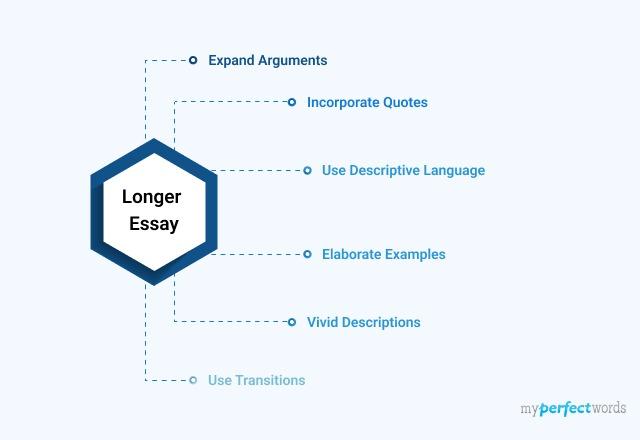
People also read
An Easy Guide to Writing an Essay
A Complete 500 Word Essay Writing Guide
A Catalog of 370+ Essay Topics for Students
Common Types of Essays - Sub-types and Examples
Essay Format: A Basic Guide With Examples
How to Write an Essay Outline in 5 Simple Steps
How to Start an Essay- A Step-by-Step Guide
A Complete Essay Introduction Writing Guide With Examples
Learn How to Write an Essay Hook, With Examples
The Ultimate Guide to Writing Powerful Thesis Statement
20+ Thesis Statement Examples for Different Types of Essays?
How to Write a Topic Sentence: Purpose, Tips & Examples
Learn How to Write a Conclusion in Simple Steps
Transition Words For Essays - The Ultimate List
4 Types of Sentences - Definition & Examples
Writing Conventions - Definition, Tips & Examples
Essay Writing Problems - 5 Most Paralyzing Problems
How to Title an Essay Properly- An Easy Guide
1000 Word Essay - A Simple Guide With Examples
A Guide to Writing a Five-Paragraph Essay
How To Write A Strong Body Paragraph
Have you ever struggled to meet the minimum word count for your essay? You're not alone. This often results in a paper that feels padded and unclear.
But don't worry! In this blog, we'll explore simple strategies to extend your essays effectively, adding both length and quality.
Let's get started.
- 1. Tip 1: Review Your Outline
- 2. Tip 2: Expand on Your Arguments
- 3. Tip 3: Incorporate Relevant Quotes
- 4. Tip 4: Use Descriptive Language
- 5. Tip 5: Explore Counterarguments in Detail
- 6. Tip 6: Expand Your Thesis
- 7. Tip 7: Elaborate on Examples
- 8. Tip 8: Analyze Data and Statistics
- 9. Tip 9: Vivid Descriptions
- 10. Tip 10: Analogies and Metaphors
- 11. Tip 11: Define Key Terms
- 12. Tip 12: Use Transitions Effectively
- 13. Tip 13: Add Subheadings
- 14. Tip 14: Revise and Edit
- 15. Tip 15: Peer Review and Feedback
Tip 1: Review Your Outline
Reviewing your essay outline is a powerful way to lengthen your essay while maintaining quality.
Start by revisiting your main points and looking for additional sub points or arguments to support your thesis. If you’ve outlined a shorter essay, consider expanding it into a five-paragraph essay .
Add more supporting details, such as evidence, quotations, or statistics, and provide more context and background information. Expand each section by breaking down complex ideas and ensuring balanced coverage across all points.
Be open to integrating new ideas from your research or writing process to add fresh perspectives.
Tip 2: Expand on Your Arguments
When you want to increase the length of your essay, start by revisiting your arguments.
Look for opportunities to provide more comprehensive explanations. Explain the "how" and "why" behind your points.
Use examples, analogies, and anecdotes to illustrate your arguments in greater detail.
For instance, if you're writing about the benefits of exercise, don't just state that exercise improves mental health. Explain how physical activity releases endorphins, which are chemicals in the brain that act as natural painkillers and mood elevators.
Describe why this process helps reduce stress and anxiety. You could add an anecdote about someone who started exercising regularly and noticed a significant improvement in their mood and overall well-being.
This not only increases the word count but also makes your argument more convincing and relatable.
Tip 3: Incorporate Relevant Quotes
Adding relevant quotations from experts, scholars, or relevant sources in essay writing can not only support your arguments but also lengthen your essay.
Ensure that these quotes are directly related to your essay topic and provide valuable insights.
Take the time to introduce, analyze, and discuss each quote, showing its relevance to your thesis.
Tip 4: Use Descriptive Language
Words have the power to transform and help your essay flow smoothly. Instead of merely stating facts or ideas, employ descriptive language to create a more vivid picture for your readers.
Appeal to their senses by describing the sights, sounds, smells, tastes, and textures associated with your subject.
This not only makes your essay longer but also engages your audience on a deeper level.
Tip 5: Explore Counterarguments in Detail
To ensure that you fully incorporate counter arguments into your essay, follow these steps:
- Present Alternative Viewpoints: Identify and present alternative viewpoints or perspectives related to your thesis. This step adds complexity to your discussion.
- Explain Their Validity: Describe the counterarguments with fairness and objectivity. Explain why some readers or experts may find these viewpoints valid or convincing. This demonstrates that you have considered multiple angles.
- Highlight Weaknesses: Delve into the weaknesses or limitations of these counterarguments. Point out where they may fall short in terms of supporting evidence, logic, or applicability.
- Provide Rebuttals: Offer well-reasoned rebuttals to counterarguments. Explain why, despite their validity in some aspects, they do not diminish the strength of your main argument.
- Maintain a Respectful Tone: Ensure your discussion of counterarguments is respectful and objective. Avoid dismissive language or ad hominem attacks. Instead, focus on the merits and drawbacks of each perspective.
Tip 6: Expand Your Thesis
Revisit your thesis statement and consider how you can broaden it without losing focus. Expanding your thesis can open up new dimensions within your essay.
Explore different angles, implications, or applications of your central argument to add depth and length to your writing.
For example, if your original thesis is "Social media negatively affects teenagers' self-esteem," you can expand it to "Social media not only negatively affects teenagers' self-esteem but also contributes to increased anxiety, depression, and distorted body image perceptions."
This expanded thesis allows you to discuss the impact on self-esteem. You can explain how social media comparison leads to anxiety and depression. Additionally, you can explore how edited images distort teenagers' body image perceptions.
Tip 7: Elaborate on Examples
If you've used examples to support your arguments, take the opportunity to explore each one in detail.
Start by explaining the context of each example. Give background information that helps the reader understand why the example is relevant.
Then, discuss the significance of the example—why is it important and what does it demonstrate about your argument? Finally, clearly relate the example back to your thesis.
Show how it supports your central point and add any additional insights that strengthen your argument.
Tip 8: Analyze Data and Statistics
If your essay relies on data or statistics, don't simply present the numbers—analyze them thoroughly.
Explain the methodology used to gather the data, discuss the significance of the data points, and explore their implications for your topic.
A comprehensive data analysis not only adds length but also strengthens your argument.
Tip 9: Vivid Descriptions
Enhance your essay by incorporating vivid descriptions. Paint a detailed picture in the reader's mind, whether you're describing a scene, character, or concept. Descriptive language can add depth and length to your writing.
Tip 10: Analogies and Metaphors
Analogies and metaphors can be powerful tools for extending your essay. They not only make your writing more engaging but also help convey complex ideas by drawing comparisons.
Tip 11: Define Key Terms
If your essay includes terminology that might be unfamiliar to some readers, take the opportunity to define these key terms. This adds clarity to your essay and expands it with necessary explanations.
Tip 12: Use Transitions Effectively
Effective transitions between body paragraphs and sections can improve the flow of your essay and make it appear longer.
Utilize transitional phrases and sentences to guide your readers through your arguments. These transitions not only enhance readability but also connect ideas, making your essay feel more cohesive.
Tip 13: Add Subheadings
To give your essay a structured and organized appearance, consider breaking it into sections with subheadings.
Each subheading can represent a different aspect or dimension of your topic. This not only makes your essay more reader-friendly but also creates the illusion of a longer piece.
Tip 14: Revise and Edit
After implementing these lengthening techniques, take the time to revise and edit your essay carefully.
Eliminate redundancies, filler words, and any content that doesn't contribute to your overall argument. A well-edited essay not only maintains quality but also ensures that every word serves a purpose, making it longer and more impactful.
Tip 15: Peer Review and Feedback
Seek feedback from peers or instructors. Others may provide suggestions for additional content or areas that need further development, helping you enhance the length and quality of your essay.
In conclusion, making your essay longer isn't just about meeting word count requirements; it's about adding depth and quality to your writing. By using the strategies discussed here, you can extend your essays and improve their substance and impact.
Are you ready to tackle your next essay with confidence? Visit MyPerfectWords.com for great writing assistance. Our essay writers can provide you with a custom essay service according to your professor’s instructions.
So why miss out? Order now!
Frequently Asked Questions
How to make sentences longer for an essay.
To lengthen sentences, use descriptive language, add supporting details, and provide examples or evidence. Combine shorter sentences into complex ones and use transitional words to create a more flowing narrative.
How to make words longer in an essay?
Expanding words can be done by using synonyms, providing definitions, or offering explanations. Additionally, using adjectives, adverbs, and descriptive phrases can make words and sentences more elaborate without sacrificing clarity.

Write Essay Within 60 Seconds!

Nova Allison is a Digital Content Strategist with over eight years of experience. Nova has also worked as a technical and scientific writer. She is majorly involved in developing and reviewing online content plans that engage and resonate with audiences. Nova has a passion for writing that engages and informs her readers.

Paper Due? Why Suffer? That’s our Job!
Keep reading

Writing Longer Papers
View in pdf format, a cyclical process.
While short assignments may lend themselves to a linear strategy – first research, then writing, then revision – longer papers require a more fluid approach. Expect to move back and forth between these stages as you craft and sharpen your argument.
For example, you might read a few sources, take notes, then write a page or two comparing them, editing what you’ve written before returning to your sources, etc. It’s fine to lack a specific thesis until you’ve done all your research; your thesis will be a result of this process rather than a precursor to it (and should reflect all of your evidence anyway).
In fact, think of your paper as having a “working thesis,” a potential thesis that is subject to change but can guide the development of your argument. Don’t be afraid to revise this all the way through the final draft of your paper, in light of your continued writing, research, and revision.
General Advice
Get started early. Long papers inevitably take time – you will be researching, writing, and revising continually. Doing so will ensure that you think about your project with the depth and complexity required of a long assignment, and that you remain engaged with your ideas.
It is natural to get stuck sometimes. Having trouble with writing? Try reading over what you’ve already written or reviewing your notes – you may come across something you hadn’t yet considered. Feeling totally adrift? Speak to your advisor or a writing tutor – this is a collaborative process, and talking through your ideas can help you to make them more concrete. Sometimes, the best thing you can do is set things aside for awhile and recharge.
If the task of writing a longer paper seems overwhelming, think back to what you know about shorter papers. Basic research and writing skills will always serve you well. Use them to your advantage.
Select a topic that interests you. Your professor is the best resource for choosing something that is broad enough to discuss at length, but narrow enough to discuss in one paper. At this early point in the process, think of your topic as a question you’re looking to answer, not a thesis you’re trying to prove.
Look through class texts and their bibliographies for potential sources. If you’re having trouble finding relevant sources, ask your advisor for suggestions. Read broadly – knowledge of opposing viewpoints will make for a stronger paper.
Take notes with writing in mind. Jot down quotes that appear important and record citations as you go. A well-organized and comprehensive set of notes will make your life much easier. Keep track of any organizational ideas, like potential connections between topics or similarities between arguments, that strike you during your research – these contain the seeds of your paper.
Remember that research is an ongoing commitment that will continue after you’ve started writing and is the key to a successful long paper.
Drafting Your Paper
If you’re having trouble coming up with an argument, think about how your notes relate to each other and try to draw interesting connections between them. This is the most effective way to produce a working thesis which you will continue to refine.
Start by writing the sections for which you have the most information, about which you have the most to say. You need not begin with the introduction and continue sequentially. Thinking about your paper in sections (regardless of whether or not you wind up dividing it that way) can help break up the work and make starting in the middle feel more natural.
Get down all that you are thinking – structural and stylistic concerns can wait. The basic organization of your paper will happen somewhat organically, depending on how your notes relate to one another and what elements you emphasize when putting them into writing. Think often about how to relate your different paragraphs to each other – what do you have to prove first?
Refining your thesis requires acknowledging counterarguments and weaknesses in what you may have originally thought you would argue. A more nuanced thesis will be more convincing and ultimately stronger than one that ignores relevant evidence for the sake of driving home one point. Because this is a longer paper, it’s perfectly all right for your thesis to be more than one sentence.
Getting your paper to reflect your improved thesis will often require some rewriting and reshuffling: it’s all part of the process. You should aim to have your entire paper reflect your thesis – if something doesn’t quite fit in, then you probably want to modify your argument or remove that example.
Remember the cyclical process. Changes will beget further changes – more research will reveal an aspect of your topic you have not yet considered, rewriting one section will give you new ideas for rewriting another, or for adding a new section. All of this is natural, and will result in a stronger final product.
Your conclusion is a chance to think back on the work that you’ve done by drawing on broader ideas, discussing a related aspect of your topic, and/or exploring areas for possible future research.
Toward a Final Draft
There is no rule for the number of drafts you should write. When you’ve gone through a few and feel that your paper is in a good spot, set it aside for a day. Return with fresh eyes and read it aloud. Your ear will catch incongruities that you might otherwise have missed.
Longer papers sometimes suffer from internal inconsistencies – each section’s argument is cogent, but the whole does not quite cohere. To remedy this, approach the paper as a critic, trying to find logical holes and contradictions. Does each section explicitly follow that which preceded it, creating a clear overall argument that advances step by step? Have you anticipated counterarguments? In a longer paper, where there is space to do so, this is especially critical.
Remember that a paper can always profit from another reader. If possible, ask your advisor or a peer to review your writing. We hear the Writing Center is pretty good at that sort of thing too…
By Will Ardery ’17 and Ian Baize ’18
Tutor appointments.
Peer tutor and consultant appointments are managed through TracCloud (login required). Find resources and more information about the ALEX centers using the following links.
Office / Department Name
Nesbitt-Johnston Writing Center
Contact Name
Jennifer Ambrose
Writing Center Director

Help us provide an accessible education, offer innovative resources and programs, and foster intellectual exploration.
Site Search
21 Helpful and Easy Tips to Make an Essay Longer
Bookman Old Style > Times New Roman.

When you're writing a school paper after researching and typing for what feels like ages, but you still haven't reached your teacher's required page count, it's normal to feel frustrated. Maybe you get a little creative and play Microsoft Word gymnastics with different fonts and spacing, or become super expressive with your descriptions. There's also a chance you missed something on the assignment rubric, or overlooked the opportunity to include more quotes from trusted sources. You might even be able to load up on a few more examples for your argument, easily boosting the word count with additional research. Still a couple pages behind the limit? Don't worry. Below, we have over 20 tips to help you hit that page requirement.
1. Make sure you included everything on the rubric. If you forgot a whole section focusing on the counter argument, that could be the reason why your paper is a couple pages shorter than needed.
2. Load up on transitional phrases. Your paper isn't long enough, therefore it may be necessary to add some transitional phrases because they take up space. On the other hand , this could make your paper really wordy, however , it may be necessary. See what I did there?
3. Spell out your numbers. There are four editorial styles — AP, APA, MLA, and Chicago. Each one has a different rule for spelling out numbers, which can work out in your favor. For instance, in APA, you write out all numbers under 10. So a one-character "7" becomes a five-character "seven." In MLA, you spell out all numbers at the beginning of a sentence, and all simple numbers (those that are one or two words). Make sure to check the assignment rubric to see what style your paper should be written in!
4. Ditch the contractions. Honestly, you probably should not even be using contractions in a formal essay, so if you are filling up your paper with "don't," "won't," and "can't," switch them out for "do not," "will not," and "cannot."
5. Use numerous examples. Make sure to do extensive research on your essay topic and come up with at least 2-3 examples for every argument presented. One example might seem like enough, but adding a couple more points improves your paper and boosts its word count.
6. Add quotes. Including quotes, whether they be from a book, news article, or trusted source, helps strengthen and validate the point you're making in a paper. But you can't just drop a quotation without context. Introducing, writing out, and properly unpacking a quote can add value — and length — to your essay.
7. Start getting really descriptive about everything. How illustrative can you get about the evolution of electricity, you ask? Well, the answer is: Very. The howling wind gushed passed Benjamin Franklin at 30 miles per hour on that cold, rainy night, pulling the string of his kite taught as it fought to stay in the sky and sent his grey hair flying up in the sky like silvery wisps.
8. Try to make your header longer. If possible, of course. Some teachers clearly state what information needs to be included in the header. But if there's no guideline, add what you can within reason — I'm not sure your teacher is going to appreciate your TikTok or Insta handle listed on the page.
9. Have someone proofread. Getting another pair of eyes to read your paper might reveal some areas in need of work. Maybe you need to elaborate a bit more on a certain argument, or include a quote to strengthen an example.
10. Revisit your introduction paragraph. Sometimes, an introduction is easiest to write after the paper has been written. Having already presented and thoroughly discussed the argument in the essay's body paragraphs, you have a more concrete understanding of what direction the paper takes. There might be some information or ideas you can add into the intro, to better set up the paper's points.
11. Make your spacing larger. Your teacher probably won't be able to tell the difference between double spacing and 2.5 spacing. *fingers crossed*
12 . While you're at it, expand the spacing between the characters. Yes, I'm talking between each and every letter.
13. Raise the font size from 12pt to 12.5pt. Nobody has to know!
14. Make all periods and commas 14pt. It sounds tedious, but simply command-f and search for the period, that way you can change all of them at once.
15. Put extra space around your (super long and bolded) title. It needs some space to shine and breathe, obvs.
16. Change the font. You can't get too crazy or else your teacher will call you out, so you stick with something super similar to Times New Roman, but slightly bigger, like Bookman Old Style. However some teachers specify a certain font in the paper's assignment requirements — in the case, don't try to switch things up.
17. Reverse outline. After you've finished penning your essay, read it through and write an outline on what you have written so far. This strategy can reveal some paragraphs in need of further development. If you notice one super long paragraph, try breaking the ideas down into separate paragraphs. This might bump the page count up a bit, and give you the opportunity to include a few more transition sentences.
18. Make your margins bigger. You have to be careful about the left and right margins, and the top can be tricky. But the bottom margin, you can practically make it as big as you want. And then you can...
19. Add a fancy footer with page numbers. Obviously (hopefully), your teacher will appreciate your attention to detail and presentation.
20. Add a header with the title of your paper to every single page. Just in case your teacher forgets what your paper is about. You only want to help.
21. Make a separate cover page. Technically, the rubric didn't say it couldn't count as page one.

When I'm not holed up in my room going on a completely unproductive Netflix binge or Tumblr stalking Timothée Chalomet, I'm searching for awesome celeb news stories that Seventeen readers will love!
Leah Campano is an Associate Editor at Seventeen, where she covers pop culture, entertainment news, health, and politics. On the weekends, you can probably find her watching marathons of vintage Real Housewives episodes or searching for New York City’s best almond croissants.

School & Campus Life

61 Gifts That’ll Make College 100x Better

16 “Hocus Pocus” Costumes That Are Scarily Good

TikTok's Beloved Stanley Cup is Back in Stock

AirPods Pro Are The Lowest Price Ever on Prime Day

Back-to-School Captions to Help You Win Day One

These Items Make Your Freshman Year SO Much Better

You Need These TikTok-Famous Amazon Travel Hacks

The Best Dorm Bedding for Your Cozy College Life

15 Cool Dorm Room Decor Ideas

35 Memes That Describe the Back to School Struggle
8 of the Best Dorm Mini Fridges
Thesis Statement: How to Make it Stronger
Sable Mc’Oneal
Sable University Writing Tips
What is Thesis Statement
The Thesis Statement is that sentence or two in your text that contains the focus of your essay and tells your reader what the essay is going to be about.
You may think of a thesis statement as an umbrella: everything that you carry along in your essay has to fit under this umbrella, and if you try to take on packages that don’t fit, you will either have to get a bigger umbrella or something’s going to get wet.
A Thesis Statement:
- Tells the reader how you will interpret the significance of the subject matterunder discussion.
2. Is a road map for the paper; in other words, it tells the reader what to expect from the rest of the paper.
3. Directly answers the question asked of you. A thesis is an of a question or subject, not the subject itself. e.g.The subject, or topic, of an essay might be World War II or Moby Dick; a thesis must then offer a way to understand the war or the novel.
4. Makes a claim that others might dispute.
4. Is usually a single sentence (or two) somewhere in your first paragraph that presents your argument to the reader. The rest of the paper, the body of the essay, gathers and organizes evidence that will persuade the reader of the logic of your interpretation.
Is Essay Without a Thesis Statement Possible?
Although it is sometimes possible to write a good essay without a thesis statement (many narrative essays, for example, contain only an implied thesis statement), the lack of a thesis statement may well be a symptom of an essay beset by a lack of focus (this must not be a case for University and Master’s writers ).
How Do I Get a Thesis?
A thesis is the result of a lengthy thinking process. Formulating a thesis is not the first thing you do after reading an essay assignment. Before you develop an argument on any topic, you have to collect and organize evidence, look for possible relationships between known facts and think about the significance of these relationships. Once you do this thinking, you will probably have a “working thesis,” a basic or main idea, an argument that you think you can support with evidence.
The thesis statement should remain flexible until the paper is actually finished. If you discover new information in the process of writing your paper that ought to be included in the thesis statement, then you’ll have to rewrite your thesis statement. On the other hand, if you discover that your paper has done adequate work but the thesis statement appears to include things that you haven’t actually addressed, then you need to limit that thesis statement.
What Is a Strong Thesis?
Very often, writers include a thesis statement to the introduction. However, it is not strong enough.
To make your thesis strong, ask yourself seven questions:
Where is my thesis statement?
You should provide a thesis early in your essay — in the introduction, or in longer essays in the second paragraph — in order to establish your position and give your reader a sense of direction.
Do I answer the question?
Re-reading the question prompt after constructing a working thesis can help you fix an argument that misses the focus of the question.
Have I taken a position that others might challenge or oppose?
If your thesis simply states facts that no one would, or even could, disagree with, it’s possible that you are simply providing a summary, rather than making an argument.
Is my thesis statement specific enough?
Thesis statements that are too vague often do not have a strong argument. Your thesis should be limited to what can be accomplished in the specified number of pages. Shape your topic so that you can get straight to the “meat” of it e.g. If your thesis contains words like “good” or “successful”, see if you could be more specific: why is something “good”; what specifically makes something “successful”?
Compare this original thesis (too general) with three possible revisions (more focused, each presenting a different approach to the same topic):
ORIGINAL THESIS (WEAK):
There are serious objections to today’s horror movies.
REVISED THESES (STRONG):
· Because modern cinematic techniques have allowed filmmakers to get more graphic, horror flicks have desensitized young American viewers to violence.
· The pornographic violence in “bloodbath” slasher movies degrades both men and women.
· Today’s slasher movies fail to deliver the emotional catharsis that 1930s horror films did.
Is my thesis statement clear?
Your thesis statement is no exception to your writing: it needs to be as clear as possible. By being as clear as possible in your thesis statement, you will make sure that your reader understands exactly what you mean.
TIP: IN ORDER TO BE AS CLEAR AS POSSIBLE IN YOUR WRITING:
· Unless you’re writing a technical report, avoid technical language. Always avoid jargon, unless you are confident your audience will be familiar with it.
· Avoid vague words such as “interesting”, “negative”, “exciting”, “unusual”, and “difficult”.
· Avoid abstract words such as “society”, “values”, or “culture”.
These words tell the reader next to nothing if you do not carefully explain what you mean by them. Never assume that the meaning of a sentence is obvious. Check to see if you need to define your terms (“socialism”, “conventional”, “commercialism”, “society”), and then decide on the most appropriate place to do so. Do not assume, for example, that you have the same understanding of what “society” means as your reader. To avoid misunderstandings, be as specific as possible.
Compare the original thesis (not specific and clear enough) with the revised version (much more specific and clear):
Although the timber wolf is a timid and gentle animal, it is being systematically exterminated. [if it’s so timid and gentle, why is it being exterminated?]
REVISED THESIS (STRONG):
Although the timber wolf is actually a timid and gentle animal, it is being systematically exterminated because people wrongfully believe it to be a fierce and cold-blooded killer.
Does my thesis include a comment about my position on the issue at hand?
The thesis statement should do more than merely announce the topic; it must reveal what position you will take in relation to that topic, how you plan to analyze/evaluate the subject or the issue. In short, instead of merely stating a general fact or resorting to a simplistic pro/con statement, you must decide what it is you have to say.
· Avoid merely announcing the topic; your original and specific “angle” should be clear. In this way you will tell your reader why your take on the issue matters.
· Avoid making universal or pro/con judgments that oversimplify complex issues.
· When you make a (subjective) judgment call, specify and justify your reasoning. “Just because” is not a good reason for an argument.
· Avoid merely reporting a fact. Say more than what is already proven fact. Go further with your ideas. Otherwise… why would your point matter?
· Though it is not a strict rule, it is better not to announce the thesis statement as if it were a thesis statement using phrases such as “The purpose of this paper is…” or “In this paper, I will attempt to…”.
In this paper, I will discuss the relationship between fairy tales and early childhood (not specific; “why does the topic matter?”).
Not just empty stories for kids, fairy tales shed light on the psychology of young children.
We must save the whales (just a universal claim; no reason stated).
Because our planet’s health may depend upon biological diversity, we should save the whales.
Socialism is the best form of government for Kenya (subjective; not justified).
If the government takes over industry in Kenya, it will become more efficient.
Hoover’s administration was rocked by scandal (thesis just reports a fact).
The many scandals of Hoover’s administration revealed basic problems with the Republican Party’s nominating process.
Is my thesis statement original?
Avoid generic arguments and formula statements. They work well to get a rough draft started, but will easily bore a reader. Keep revising until the thesis reflects your real ideas.
TIP: THE POINT YOU MAKE IN THE PAPER SHOULD MATTER:
· Be prepared to answer “So what?” about your thesis statement.
· Be prepared to explain why the point you are making is worthy of a paper. Why should the reader read it?
Compare the following:
There are advantages and disadvantages to using statistics ( a fill-in-the-blank formula ).
· Careful manipulation of data allows a researcher to use statistics to support any claim she desires.
· In order to ensure accurate reporting, journalists must understand the real significance of the statistics they report.
· Because advertisers consciously and unconsciously manipulate data, every consumer should learn how to evaluate statistical claims.
Avoid formula and generic words. Search for concrete subjects and active verbs, revising as many “to be” verbs as possible. A few suggestions below show how specific word choice sharpens and clarifies your meaning.
ORIGINAL (PRETENDS TO BE A WEAK THESIS):
“Society is…” [who is this “society” and what exactly is it doing?]
REVISED (PRETENDS TO BE A STRONG THESIS):
“Men and women will learn how to…”, “writers can generate…”, “television addicts may chip away at…”, “American educators must decide…”, “taxpayers and legislators alike can help fix…”
“the media”
“the new breed of television reporters”, “advertisers”, “hard-hitting print journalists”, “horror flicks”, “TV movies of the week”, “sitcoms”, “national public radio…”
“is, are, was, to be” or “to do, to make”
any great action verb you can concoct: “to generate”, “to demolish”, “to batter”, “to revolt”, “to discover”, “to flip”, “to signify”, “to endure…”
By contrast… Five kinds of weak thesis statements — ones that
· make no claim (“This paper will examine the pros and cons of…”);
· are obviously true or are a statement of fact (“Exercise is good for you”);
· restate conventional wisdom (“Love conquers all”);
· offer personal conviction as the basis for the claim (“Shopping malls are wonderful places”); and
· make an overly broad claim (“Individualism is good”).
Study More Examples
You read the essay assignment, which runs: Compare and contrast the reasons why the North and South fought the Civil War. Your first thesis statement is:
The North and South fought the Civil War for many reasons, some of which were the same and some different.
This weak thesis restates the question without providing any additional information. You will expand on this new information in the body of the essay, but it is important that the reader know where you are heading. A reader of this weak thesis might think, “What reasons? How are they the same? How are they different?” Ask yourself these same questions and begin to compare Northern and Southern attitudes (perhaps you first think, “The South believed slavery was right, and the North thought slavery was wrong”). Now, push your comparison toward an interpretation — why did one side think slavery was right and the other side think it was wrong? You look again at the evidence, and you decide that you are going to argue that the North believed slavery was immoral while the South believed it upheld the Southern way of life.
After such an analysis you write:
While both sides fought the Civil War over the issue of slavery, the North fought for moral reasons while the South fought to preserve its own institutions.
Now you have a working thesis! Included in this working thesis is a reason for the war and some idea of how the two sides disagreed over this reason. As you write the essay, you will probably begin to characterize these differences more precisely, and your working thesis may start to seem too vague. Maybe you decide that both sides fought for moral reasons, and that they just focused on different moral issues.
You end up revising the working thesis into a final thesis that really captures the argument in your paper:
While both Northerners and Southerners believed they fought against tyranny and oppression, Northerners focused on the oppression of slaves while Southerners defended their own right to self-government.
Compare this to the original weak thesis. This final thesis presents a way of interpreting evidence that illuminates the significance of the question. Keep in mind that this is one of many possible interpretations of the Civil War — it is not the one and only right answer to the question. There isn’t one right answer; there are only strong and weak thesis statements and strong and weak uses of evidence.
Most parts of this guide originally appeared in University of Illinois at Urbana-Champaign’s Center for writing studies and Atlanta University Center Robert W. Woodruff Librray’s Website
As always, if you still don’t understand how to write a thesis statement or don’t have time to craft a paper, reach me at [email protected] for help. Happy writing!

Written by Sable Mc’Oneal
Text to speech
How to Make a College Paper Longer
101dalmatians / Getty Images
- Before You Arrive
- Health, Safety, and Nutrition
- Living On Campus
- Outside The Classroom
- Graduation & Beyond
- Homework Help
- Private School
- College Admissions
- Graduate School
- Business School
- Distance Learning
- M.Ed., Higher Education Administration, Harvard University
- B.A., English and Comparative Literary Studies, Occidental College
Need to make a paper longer but out of ideas? Forget fudging the margins and font or even the legendary "period trick." These 6 tips will make your paper longer—and better!
Avoid the Old, Obvious Tricks
First and foremost, know that your professor most likely knows about all of the "easy" tricks and can spot 'em! Changing the font, changing the margins, doing the "period trick," and tons of other sneaky ways to make your paper longer have all been done before and then some. Since you need to make your paper longer , not worse , skip the easy stuff and focus on the content.
Cite a Few Sources
Add additional quotations to support your examples. If your paper is good, you'll have examples to support your thesis . To make your paper even better (and longer), make sure you have at least one quotation from the text—if not more—to support your examples. (And be careful about citing your quotations accurately, too.)
Add Some Examples to Your Paper
Add an additional example to each paragraph/argument/idea. If you can't add more quotations , add more examples to support your position. Think about more ways to make your point by showing —not just telling—the reader.
Check Your Paragraph Format
Make sure each paragraph has a topic sentence , supporting evidence , and a concluding/transition sentence. Of course, each paragraph should have more than just these three sentences, but you might be surprised at how easily each can be left off—and how much longer your paper can become if you go back through and insert missing items where needed.
See If You Can Prove Yourself Wrong
Think about the arguments against your thesis—and then make sure you've addressed those points. Sure, you may have good arguments for your position. But what would someone holding the opposite position say? And what would you say in response? Making sure those responses are already included in your paper is a great way to make sure you've covered all the bases... and a great way to add some length if your paper is a little shorter than you'd like.
Make Sure Your Paper Structure Is Solid
Confirm and reconfirm that you have a strong introduction , thesis statement , and conclusion . Although you may be focused on the body of your paper and the evidence supporting your position, having a strong intro, thesis, and conclusion are important, too. Making sure your paper starts with a bang (good intro), has a solid foundation to stand on (strong thesis), and leaves the reader convinced (stellar conclusion) is a great way to make sure your paper is all-around better—and longer!
- 100 Persuasive Essay Topics
- Tips on How to Write an Argumentative Essay
- What Is Expository Writing?
- How To Write an Essay
- How to Write a Research Paper That Earns an A
- Tips for Writing an Art History Paper
- The Ultimate Guide to the 5-Paragraph Essay
- Definition and Examples of Analysis in Composition
- The Difference Between Revising and Editing
- Understanding Organization in Composition and Speech
- 5 Steps to Writing a Position Paper
- How to Structure an Essay
- How Can You Stretch a Paper to Make it Longer?
- An Introduction to Academic Writing
- Make Your Paragraphs Flow to Improve Writing
- Formatting Papers in Chicago Style
- Thesis Action Plan New
- Academic Project Planner
Literature Navigator
Thesis dialogue blueprint, writing wizard's template, research proposal compass.
- Why students love us
- Why professors love us
- Rebels Blog (Free)
- Why we are different
- All Products
- Coming Soon
The Ideal Length: Unpacking How Long Your Thesis Statement Should Be

In the academic realm, the thesis statement is the cornerstone of a strong essay or research paper. It serves as a compact reflection of the argument or analysis that follows, guiding both the writer and the reader through the text. Crafting the ideal thesis statement involves striking a balance between brevity and comprehensiveness, ensuring that it is concise yet encapsulates the essence of the research. This article delves into the nuances of thesis statement length and offers practical advice for developing a clear and effective thesis.
Key Takeaways
- A thesis statement should be concise, typically one sentence, and clearly present the main argument or claim of the paper.
- Effective thesis statements are specific and narrow the topic, providing a roadmap for the content that follows.
- The ideal length of a thesis statement balances brevity with the need to be comprehensive enough to guide the research.
- Structural techniques, such as the three-prong approach, can help in constructing a coherent and logically flowing thesis statement.
- The complexity and academic level of the paper may influence the length and depth of the thesis statement.
Defining the Thesis Statement: Scope and Function
The core purpose of a thesis statement.
At the heart of your academic writing lies the thesis statement , a pivotal element that articulates the central argument of your work. A thesis statement guides the reader by presenting the main argument and providing focus and direction. It is not merely a statement of fact, but rather a claim that requires evidence and rationale. The purpose of a thesis statement is to inform the reader of the topic to be discussed and to present the writer's stance or argument on that topic.
An effective thesis statement is succinct yet comprehensive, encapsulating the essence of your research in a single sentence. It should be specific enough to give a clear indication of your research scope, yet broad enough to encompass the various aspects that you will address. Here's a simple breakdown of what a thesis statement should include:
- Topic: The subject matter of your research.
- Claim: Your assertion or main argument about the topic.
- Supporting evidence: The key points that back up your claim.
Remember, the clarity and precision of your thesis statement will set the tone for the entire paper, guiding your research and writing efforts towards a coherent and impactful conclusion.
Characteristics of an Effective Thesis
An effective thesis statement is the backbone of a well-structured paper. It serves as a roadmap for your readers, guiding them through the arguments and evidence that you will present. Your thesis should make a clear assertion , reflecting your position on the topic. It's not merely a statement of fact, but a claim that requires evidence and reasoning to support it.
To ensure that your thesis is both manageable and significant, it should be narrow enough to be covered in the scope of your paper, yet broad enough to allow for a comprehensive discussion. Here are some key characteristics to aim for:
- Arguable : Your thesis should present a point that could be challenged or opposed by others.
- Specific : Avoid vague language by being as precise as possible about what you will discuss.
- Focused : Stay on topic and ensure that all parts of your thesis are relevant to the main argument.
Remember, the strength of your thesis is not just in its length, but in its ability to convey complex ideas succinctly and persuasively. As you engage in thesis writing , consider the challenges such as time management and staying motivated. Utilize tools for academic planning and ensure your research proposal adheres to ethical standards. By balancing these elements, you will craft a thesis that not only stands out but also provides a clear direction for your research.
The Role of a Thesis Statement in Guiding Research
A thesis statement serves as a compass for your research journey, providing direction and boundaries for your scholarly exploration. It is the assertion of your study, the claim you set out to prove, and it should be crafted with precision to guide your research effectively. Your thesis statement is the anchor of your entire paper , ensuring that all subsequent research aligns with your central argument.
When you begin to how to find research question , the thesis statement becomes a critical tool. It narrows down the scope of your inquiry and sets clear objectives , which are essential for focused research. A well-defined thesis statement delineates the boundaries of your study, preventing you from veering off into unrelated territories. Consider the following points to ensure your thesis statement fulfills its role in guiding your research:
- It should clearly state the purpose of your research.
- It must be specific enough to provide a clear direction.
- It should be broad enough to allow for comprehensive exploration within the set boundaries.
By adhering to these guidelines, you can ensure that your thesis statement acts as a reliable guide throughout your research process, leading to a coherent and impactful scholarly work.
Crafting the Ideal Thesis Statement: Length and Clarity
Balancing brevity with comprehensiveness.
Striking the right balance between brevity and comprehensiveness in your thesis statement is crucial. Your thesis should be succinct yet sufficiently detailed to guide your research and inform your readers of the scope and direction of your paper. It's a delicate dance between being concise and including enough information to be clear and informative.
To achieve this balance, start by drafting a statement that encapsulates the main point of your research. Then, critically evaluate each word for its contribution to your statement's clarity and purpose. Precision is key; every term should add value and meaning. For instance, rather than saying 'various factors affect climate change,' specify which key factors you will explore.
Consider the following list to refine your thesis statement:
- Identify the core message of your research.
- Eliminate redundant or non-essential words.
- Ensure technical terms are necessary and well-defined.
- Revise for clarity and brevity , as suggested by the snippet: 'Refine your thesis to make it as clear and concise as possible.'
Remember, a well-balanced thesis statement serves as a beacon for your entire research project , providing a clear path for you and your readers to follow.
Achieving Precision in Your Thesis Statement
To achieve precision in your thesis statement, you must distill your argument to its essence. A precise thesis statement clearly expresses your position on the topic, whether you are supporting, refuting, or analyzing an idea. It is the compass that guides your research and writing, ensuring that every element of your paper aligns with your central claim. Avoid vague language and be as specific as possible without delving into the details reserved for the body of your work.
Consider the following steps to refine your thesis statement:
- Identify the core message you wish to convey.
- Eliminate any superfluous information that does not directly support your main point .
- Use active verbs and assertive language to articulate your stance.
- Test the specificity of your thesis by checking if it clearly outlines the scope of your paper.
Remember, a well-crafted thesis statement not only provides clarity on the subject but also makes the main point of your paper more impactful. By maintaining a formal and unbiased tone, you avoid emotional language that could detract from the academic rigor of your thesis.
The Impact of Thesis Length on Reader Comprehension
The length of your thesis statement can significantly influence reader comprehension. A statement that is too brief may fail to provide enough information, leaving readers with questions about your argument's scope and direction. Conversely, an overly long thesis can overwhelm readers with details, obscuring the main point. Striking a balance is key ; your thesis should be concise enough to maintain reader engagement while providing sufficient insight into your research focus.
To achieve this balance, consider the following points:
- Ensure your thesis is directly related to the research question .
- Include only the most pertinent information that supports your argument.
- Avoid unnecessary jargon or complex language that may confuse readers.
Remember, the goal is to guide your readers through your argument with clarity and precision. Websites that offer tools for thesis writing emphasize the importance of a clear thesis in academic research. They provide resources such as worksheets and guides to help you refine your thesis statement, ensuring it serves its purpose effectively.
Structural Elements of a Thesis Statement
The three-prong approach to thesis construction.
When you embark on the journey of crafting your thesis statement, the three-prong approach offers a structured method to ensure clarity and direction. This technique involves stating your main claim and outlining three supporting points that bolster your argument. Your thesis becomes a roadmap , guiding both your writing process and your reader's understanding.
To construct a three-prong thesis, start with your central claim, then identify three key points that substantiate this claim. These points should be ordered logically, as they will correspond to the structure of your essay. Here's a simple breakdown:
- State your main claim (what you are trying to prove).
- Outline your first supporting point.
- Detail your second supporting point.
- Conclude with your third supporting point.
Remember, each supporting point will be explored in depth within the body of your work, so choose them wisely. By adhering to this approach, you create a thesis that not only presents your argument but also organizes the content to follow, making your writing more effective and comprehensible.
Utilizing Connecting Words for Coherence
To achieve coherence in your thesis statement, it is essential to use connecting words effectively. These linguistic tools serve as bridges between your claim and the supporting points, ensuring a smooth transition that guides the reader through your argument. Consider starting with an attention-grabbing sentence, perhaps using a surprising statistic or an intriguing example, to captivate your audience from the outset.
By employing connecting words such as 'because', 'due to', and 'as a result of', you create a logical structure that enhances the flow of your thesis statement. This technique not only clarifies the relationship between different components of your argument but also reinforces the central message of your research. Below is a list of connecting words that can be strategically placed to maintain coherence:
- as a result of
- demonstrated by
- in order to
Remember to repeat key terms throughout your essay, especially in the thesis and at the beginning of paragraphs, to remind readers of your core message and maintain lexical coherence.
Ordering Supporting Points for Logical Flow
When you construct your thesis statement, the ordering of your supporting points is crucial for establishing a clear and logical flow. Start by identifying all key points in your argument and then organize them in a manner that guides the reader through your reasoning. Typically, this order mirrors the structure of your essay: an introduction of the main argument, followed by the supporting points, and culminating in a strong conclusion.
Each supporting point should be linked to the next with the use of connecting words, ensuring coherence throughout your thesis. This not only strengthens the readability of your thesis but also provides a roadmap for your research, allowing you to analyze your data with precision. Consider the following list of connecting words to enhance the flow between points:
By meticulously structuring your thesis statement in this way, you set the stage for a compelling and persuasive essay that is easy for your readers to follow.
Practical Techniques for Thesis Development
Employing the three-prong formula.
When you embark on the journey of crafting your thesis statement, the three-prong formula offers a structured approach to ensure clarity and direction. Your thesis statement should encapsulate your main argument plus three supporting points , providing a clear roadmap for your essay. This formula not only asserts your central claim but also organizes the subsequent analysis into manageable segments.
To effectively employ this method, begin by identifying your primary conclusion. Then, determine the main issues you will analyze, which will serve as the supporting points. For instance, if your thesis is about the best film adaptations, your supporting points might explore critical response, box office success, and industry impact. Here's a simple breakdown:
- Main conclusion: The central argument or stance you are taking.
- Supporting point 1: The first aspect you will discuss in your essay.
- Supporting point 2: The second aspect, following the logical sequence.
- Supporting point 3: The final aspect, rounding out your argument.
As you develop your thesis, remember to consult various resources to strengthen your points. Utilizing how to find literature guides can be instrumental in gathering relevant information to back your claims. Websites offering thesis resources and academic tools can provide additional support, featuring worksheets, testimonials, and research guidance to aid in your thesis success.
Refining Your Thesis Through Revision
Revision is a critical step in honing your thesis statement to perfection. Initially, your thesis may start as a broad declaration of your study's intent. However, through revision, you can transform it into a sharp, focused argument that clearly conveys your position. An effective thesis should be argumentative and controversial , meaning it should invite plausible counterarguments, which in turn strengthens the discourse around your research.
When refining your thesis, consider its scope. If you're struggling to find sufficient information, your topic might be too narrow. Broaden it by exploring related issues or employing comparative analyses. Conversely, a thesis that is too broad may lack depth and specificity. Narrow it down by focusing on particular aspects or perspectives of your topic. This process of adjustment ensures that your thesis is neither too broad nor too narrow, but just right.
Here are some steps to guide you in the revision process:
- Evaluate the specificity of your thesis: Is it too vague or overly general?
- Ensure that your thesis makes an assertive claim and invites discussion.
- Check the logical flow of your supporting points; they should build upon each other coherently.
- Seek feedback from peers or mentors to gain different perspectives on your thesis's clarity and argumentative strength.
Remember, refining your thesis is an iterative process. It may require multiple drafts before you arrive at the ideal statement that encapsulates the essence of your research with precision and clarity.
Examples and Templates for Thesis Statements
As you embark on the journey of crafting your thesis statement, it's helpful to have concrete examples and templates at your disposal. These serve as guides to shape your own scholarly assertions, ensuring they are both robust and succinct. Sample thesis statements can illuminate the path from a broad topic to a focused argument, demonstrating how to encapsulate complex ideas into a single, compelling sentence.
To illustrate, consider the following template: "Despite [evidence that suggests otherwise], [aspect A] is [significant/important] because [reason 1], [reason 2], and [reason 3]." This structure aids in achieving clarity and precision, while also providing a logical flow for your argument. The use of connecting words such as 'despite' and 'because' adds coherence, guiding the reader through your line of reasoning.
In addition to templates, online resources like the Purdue University Online Writing Lab offer invaluable tips and further examples for writing thesis statements. Universities often provide structured formats to help you develop a thesis that stands firm on its scholarly merits. By utilizing these resources, you can refine your thesis to effectively map out the content of your research, making it a powerful anchor for your academic work.
Advanced Considerations for Thesis Statements
Adapting thesis length to academic levels.
As you progress through your academic career, the expectations for your thesis statement—and indeed, the thesis itself—will evolve. At the undergraduate level, a thesis statement may be a concise sentence that clearly states the argument or premise of your paper. However, as you move into graduate studies, the complexity of your research will likely increase, necessitating a more detailed thesis statement that can span several sentences or even a full paragraph.
The length of your thesis statement should be commensurate with the depth of your research and the academic rigor of your program. For instance, a master's thesis may require a more nuanced thesis statement that addresses multiple facets of the research question, while a doctoral dissertation could demand an even more comprehensive and intricate statement to encapsulate the breadth of the inquiry.
To illustrate, consider the following academic levels and their corresponding thesis statement lengths:
- Undergraduate: 1-2 sentences
- Master's: 2-3 sentences
- Doctoral: A full paragraph or more
Remember, the goal is to convey your research's scope and significance without sacrificing clarity for brevity. Striking this balance is key to crafting an effective thesis statement that resonates with your audience and provides a clear roadmap for your research.
Navigating Complex Arguments in Thesis Statements
When you're tasked with crafting a thesis statement that encapsulates complex arguments, it's natural to feel a surge of thesis anxiety . However, the key to navigating this challenge lies in structuring your statement to convey intricate ideas with clarity and precision. Start by breaking down your argument into its core components ; this will help you to maintain focus and avoid becoming overwhelmed.
To ensure that your thesis remains coherent despite its complexity, consider the following points:
- Identify the main claim and its significance.
- Outline the supporting arguments or evidence.
- Clarify the relationships between the different parts of the argument.
By methodically organizing your thoughts and articulating the connections between them, you can create a thesis statement that is both comprehensive and comprehensible. Websites that offer tools for thesis writing, such as worksheets, templates, and guides , can be invaluable in this process. They provide structured support to help you refine your thesis, ensuring that your complex arguments are presented in a way that is accessible to your readers.
The Evolution of Thesis Statements in Scholarly Writing
As you delve into the realm of scholarly writing, you'll notice that thesis statements have undergone a significant transformation over time. Initially, theses were often straightforward assertions , but as academic discourse has evolved, so has the complexity of thesis statements. They now encapsulate not only the central argument but also the nuances and subtleties of the writer's stance.
In contemporary scholarship, a thesis statement is expected to be a dynamic entity, adapting to the depth and breadth of the research it represents. It's not uncommon for a thesis to be a multi-sentence construct, especially in works that tackle intricate subjects or extensive research projects. The key is to maintain clarity and direction, regardless of length , ensuring that your thesis acts as a reliable compass for your readers.
To illustrate this evolution, consider the following points:
- Thesis statements have transitioned from simple claims to complex, argumentative constructs.
- The expectation for precision and specificity in a thesis has increased.
- Academic disciplines now often dictate the form and function of a thesis, with variations across fields.
Embrace this progression by crafting a thesis that is not only informative but also reflective of the scholarly maturity expected in your field of study.
Delving into the realm of thesis writing can be daunting, but with the right guidance, it becomes an enlightening journey. Our 'Advanced Considerations for Thesis Statements' section is designed to equip you with the nuanced understanding necessary to craft compelling and sophisticated thesis statements. Don't let anxiety and uncertainty hinder your academic progress. Visit our website now to explore our comprehensive Thesis Action Plan and take the first step towards thesis mastery. Transform your sleepless nights into a celebration of knowledge with Research Rebels.
In conclusion, the ideal length of a thesis statement is a nuanced matter, contingent upon the scope and complexity of the research topic. While brevity is essential, with high school essays typically requiring a single sentence, more extensive research endeavors may necessitate a longer, multi-sentence thesis. The thesis statement must be concise yet comprehensive, providing a clear claim and a roadmap for the essay. It should not merely announce the topic but take a definitive stand, guiding the reader through the argument with a logical sequence of supporting points. Ultimately, the thesis statement is the anchor of the essay, and its precision and clarity are paramount to effectively communicating the essence of the research and the writer's stance.
Frequently Asked Questions
What is a thesis statement and why is it important.
A thesis statement is a concise summary of the main point or claim of an essay or research paper. It is important because it guides the direction of your research and outlines the scope of the essay for the reader.
How long should a thesis statement be?
A thesis statement should be concise and usually one sentence long. It should be long enough to cover the main points but short enough to remain clear and focused.
Can a thesis statement be more than one sentence?
Typically, a thesis statement should be one sentence. However, for complex papers or detailed arguments, it may extend to two sentences to include all relevant points.
What is the three-prong approach to thesis construction?
The three-prong approach is a method of structuring a thesis statement by presenting three supporting points that outline the main arguments of the paper.
How does the length of a thesis statement affect reader comprehension?
The length of a thesis statement can impact reader comprehension by providing clarity and focus. Too long and it may confuse the reader; too short and it may not convey enough information.
Should the complexity of a thesis statement vary with academic levels?
Yes, the complexity of a thesis statement may increase with higher academic levels to reflect the depth of analysis and research required for advanced scholarly writing.

AI for Academia: Revolutionizing Research and Learning
How do you write a hypothesis step-by-step instructions, how to write a bachelor thesis: tips and tricks, how to write the best dissertation: a comprehensive guide, help with your master thesis: essential resources and advice.

Demystifying Research: Understanding the Difference Between a Problem and a Hypothesis

Avoiding Procrastination Pitfalls: Bachelor Thesis Progress and Weekend Celebrations
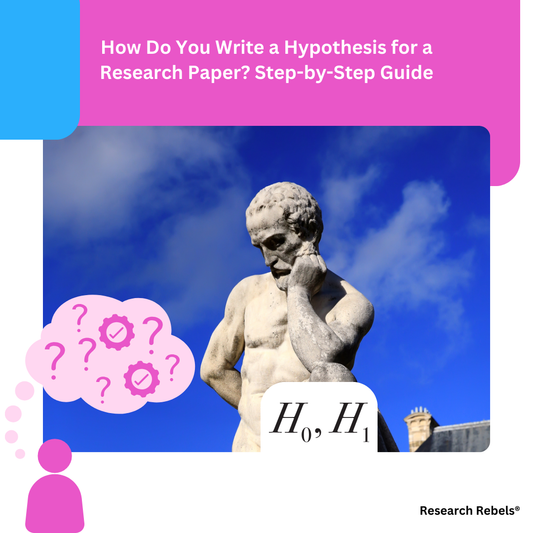
How Do You Write a Hypothesis for a Research Paper? Step-by-Step Guide

How to Write a Thesis Fast: Tips and Strategies for Success

The Note-Taking Debate: Pros and Cons of Digital and Analog Methods
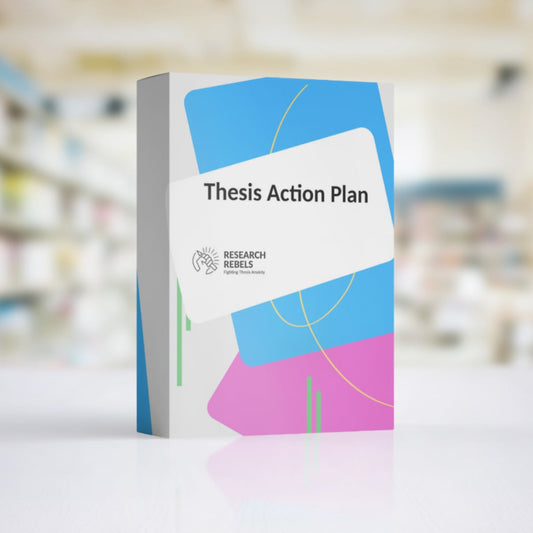
Thesis Action Plan

- Rebels Blog
- Blog Articles
- Terms and Conditions
- Payment and Shipping Terms
- Privacy Policy
- Return Policy
© 2024 Research Rebels, All rights reserved.
Your cart is currently empty.

Get science-backed answers as you write with Paperpal's Research feature
8 Most Effective Ways to Increase Motivation for Thesis Writing

Writing a master’s or doctoral thesis is a tough job, and many students struggle with writer’s block and putting off work. The journey requires not just skill and knowledge but a sustained motivation for thesis writing. Here are eight essential strategies to help you find and maintain your motivation to write your thesis throughout the thesis writing process.
Know why you lack motivation
It’s important to understand whether you’re just avoiding writing (procrastination) or if you genuinely don’t feel interested in it (lack of motivation). Procrastination is when you delay writing even though you want to finish it, while a lack of motivation for thesis writing is when you have no interest in writing at all. Knowing the difference helps you find the right solution. Remember, not feeling motivated doesn’t mean you can’t write; it just might be less enjoyable.
Recognize external vs. internal motivation
In the early stages of your academic journey, things like job prospects or recognition may motivate you to write your thesis. These are external motivators. Over time, they might become less effective. That’s why it’s important to develop internal motivators, like a real passion for your topic, curiosity, or wanting to make a difference in your field. Shifting to these internal motivators can keep you energized about your thesis writing for a longer period.
Develop a writing plan
As you regularly spend time on your thesis, you’ll start to overcome any initial resistance. Planning and thinking about your work will make the next steps easier. You might find yourself working more than 20 minutes some days. As you progress, plan for longer thesis writing periods and set goals for completing each chapter.
Don’t overwhelm yourself
Getting stuck is normal in thesis or dissertation writing. Don’t view these challenges as impossible obstacles. If you’re frustrated or unsure, take a break for a few days. Then, consult your advisor or a mentor to discuss your challenges and find ways to move forward effectively.
Work on your thesis daily
Try to spend 15-20 minutes daily on tasks related to your thesis or dissertation. This includes reading, researching, outlining, and other preparatory activities. You can fit these tasks into short breaks throughout your day, like waiting for appointments, during commutes, or even while cooking.
Understand that thesis writing motivation changes
Realize that thesis writing motivation isn’t always the same; it changes over time. Your drive to write will vary with different stages of your research and life changes. Knowing that motivation can go up and down helps you adapt. When you feel less motivated, focus on small, doable parts of your work instead of big, intimidating goals.
Recharge your motivation regularly
Just like you need to rest and eat well to keep your body energized, your motivation for thesis writing needs to be refreshed too. Do things that boost your mental and creative energy. This could be talking with colleagues, attending workshops, or engaging in hobbies that relax you. Stay aware of your motivation levels and take action to rejuvenate them. This way, you can avoid burnout and keep a consistent pace in your thesis work.
Keep encouraging yourself
Repeating encouraging phrases like “I will finish my thesis by year’s end” or “I’ll complete a lot of work this week” can really help. Saying these affirmations regularly can focus your energy and keep you on track with your thesis writing motivation .
Remember, the amount you write can vary each day. Some days you might write a lot, and other days less. The key is to keep writing, even if it’s just rough ideas or jumbled thoughts. Don’t let the need for perfection stop you. Listening to podcasts where researchers talk about their writing experiences can also be inspiring and motivate you in your writing journey.
Paperpal is an AI writing assistant that help academics write better, faster with real-time suggestions for in-depth language and grammar correction. Trained on millions of research manuscripts enhanced by professional academic editors, Paperpal delivers human precision at machine speed.
Try it for free or upgrade to Paperpal Prime , which unlocks unlimited access to premium features like academic translation, paraphrasing, contextual synonyms, consistency checks and more. It’s like always having a professional academic editor by your side! Go beyond limitations and experience the future of academic writing. Get Paperpal Prime now at just US$19 a month!
Related Reads:
How to make your thesis supervision work for you.
- 6 Tips for Post-Doc Researchers to Take Their Career to the Next Level
- How to Write a Conclusion for Research Papers (with Examples)
- Presenting Research Data Effectively Through Tables and Figures
CACTUS Joins Hands with Taylor & Francis to Simplify Editorial Process with a Pioneering AI Solution
You may also like, what’s the best chatgpt alternative for academic writing, addressing peer review feedback and mastering manuscript revisions..., what is the importance of a concept paper..., how to write the first draft of a..., mla works cited page: format, template & examples, how to write a high-quality conference paper, how paperpal’s research feature helps you develop and..., how to write a successful book chapter for..., academic editing: how to self-edit academic text with..., what are scholarly sources and where can you....
Have a language expert improve your writing
Run a free plagiarism check in 10 minutes, generate accurate citations for free.
- Knowledge Base
- Dissertation
How to Write a Thesis or Dissertation Conclusion
Published on September 6, 2022 by Tegan George and Shona McCombes. Revised on November 20, 2023.
The conclusion is the very last part of your thesis or dissertation . It should be concise and engaging, leaving your reader with a clear understanding of your main findings, as well as the answer to your research question .
In it, you should:
- Clearly state the answer to your main research question
- Summarize and reflect on your research process
- Make recommendations for future work on your thesis or dissertation topic
- Show what new knowledge you have contributed to your field
- Wrap up your thesis or dissertation
Instantly correct all language mistakes in your text
Upload your document to correct all your mistakes in minutes

Table of contents
Discussion vs. conclusion, how long should your conclusion be, step 1: answer your research question, step 2: summarize and reflect on your research, step 3: make future recommendations, step 4: emphasize your contributions to your field, step 5: wrap up your thesis or dissertation, full conclusion example, conclusion checklist, other interesting articles, frequently asked questions about conclusion sections.
While your conclusion contains similar elements to your discussion section , they are not the same thing.
Your conclusion should be shorter and more general than your discussion. Instead of repeating literature from your literature review , discussing specific research results , or interpreting your data in detail, concentrate on making broad statements that sum up the most important insights of your research.
As a rule of thumb, your conclusion should not introduce new data, interpretations, or arguments.
Prevent plagiarism. Run a free check.
Depending on whether you are writing a thesis or dissertation, your length will vary. Generally, a conclusion should make up around 5–7% of your overall word count.
An empirical scientific study will often have a short conclusion, concisely stating the main findings and recommendations for future research. A humanities dissertation topic or systematic review , on the other hand, might require more space to conclude its analysis, tying all the previous sections together in an overall argument.
Your conclusion should begin with the main question that your thesis or dissertation aimed to address. This is your final chance to show that you’ve done what you set out to do, so make sure to formulate a clear, concise answer.
- Don’t repeat a list of all the results that you already discussed
- Do synthesize them into a final takeaway that the reader will remember.
An empirical thesis or dissertation conclusion may begin like this:
A case study –based thesis or dissertation conclusion may begin like this:
In the second example, the research aim is not directly restated, but rather added implicitly to the statement. To avoid repeating yourself, it is helpful to reformulate your aims and questions into an overall statement of what you did and how you did it.
Your conclusion is an opportunity to remind your reader why you took the approach you did, what you expected to find, and how well the results matched your expectations.
To avoid repetition , consider writing more reflectively here, rather than just writing a summary of each preceding section. Consider mentioning the effectiveness of your methodology , or perhaps any new questions or unexpected insights that arose in the process.
You can also mention any limitations of your research, but only if you haven’t already included these in the discussion. Don’t dwell on them at length, though—focus on the positives of your work.
- While x limits the generalizability of the results, this approach provides new insight into y .
- This research clearly illustrates x , but it also raises the question of y .
You may already have made a few recommendations for future research in your discussion section, but the conclusion is a good place to elaborate and look ahead, considering the implications of your findings in both theoretical and practical terms.
- Based on these conclusions, practitioners should consider …
- To better understand the implications of these results, future studies could address …
- Further research is needed to determine the causes of/effects of/relationship between …
When making recommendations for further research, be sure not to undermine your own work. Relatedly, while future studies might confirm, build on, or enrich your conclusions, they shouldn’t be required for your argument to feel complete. Your work should stand alone on its own merits.
Just as you should avoid too much self-criticism, you should also avoid exaggerating the applicability of your research. If you’re making recommendations for policy, business, or other practical implementations, it’s generally best to frame them as “shoulds” rather than “musts.” All in all, the purpose of academic research is to inform, explain, and explore—not to demand.
Make sure your reader is left with a strong impression of what your research has contributed to the state of your field.
Some strategies to achieve this include:
- Returning to your problem statement to explain how your research helps solve the problem
- Referring back to the literature review and showing how you have addressed a gap in knowledge
- Discussing how your findings confirm or challenge an existing theory or assumption
Again, avoid simply repeating what you’ve already covered in the discussion in your conclusion. Instead, pick out the most important points and sum them up succinctly, situating your project in a broader context.
The end is near! Once you’ve finished writing your conclusion, it’s time to wrap up your thesis or dissertation with a few final steps:
- It’s a good idea to write your abstract next, while the research is still fresh in your mind.
- Next, make sure your reference list is complete and correctly formatted. To speed up the process, you can use our free APA citation generator .
- Once you’ve added any appendices , you can create a table of contents and title page .
- Finally, read through the whole document again to make sure your thesis is clearly written and free from language errors. You can proofread it yourself , ask a friend, or consider Scribbr’s proofreading and editing service .
Here is an example of how you can write your conclusion section. Notice how it includes everything mentioned above:
V. Conclusion
The current research aimed to identify acoustic speech characteristics which mark the beginning of an exacerbation in COPD patients.
The central questions for this research were as follows: 1. Which acoustic measures extracted from read speech differ between COPD speakers in stable condition and healthy speakers? 2. In what ways does the speech of COPD patients during an exacerbation differ from speech of COPD patients during stable periods?
All recordings were aligned using a script. Subsequently, they were manually annotated to indicate respiratory actions such as inhaling and exhaling. The recordings of 9 stable COPD patients reading aloud were then compared with the recordings of 5 healthy control subjects reading aloud. The results showed a significant effect of condition on the number of in- and exhalations per syllable, the number of non-linguistic in- and exhalations per syllable, and the ratio of voiced and silence intervals. The number of in- and exhalations per syllable and the number of non-linguistic in- and exhalations per syllable were higher for COPD patients than for healthy controls, which confirmed both hypotheses.
However, the higher ratio of voiced and silence intervals for COPD patients compared to healthy controls was not in line with the hypotheses. This unpredicted result might have been caused by the different reading materials or recording procedures for both groups, or by a difference in reading skills. Moreover, there was a trend regarding the effect of condition on the number of syllables per breath group. The number of syllables per breath group was higher for healthy controls than for COPD patients, which was in line with the hypothesis. There was no effect of condition on pitch, intensity, center of gravity, pitch variability, speaking rate, or articulation rate.
This research has shown that the speech of COPD patients in exacerbation differs from the speech of COPD patients in stable condition. This might have potential for the detection of exacerbations. However, sustained vowels rarely occur in spontaneous speech. Therefore, the last two outcome measures might have greater potential for the detection of beginning exacerbations, but further research on the different outcome measures and their potential for the detection of exacerbations is needed due to the limitations of the current study.
Checklist: Conclusion
I have clearly and concisely answered the main research question .
I have summarized my overall argument or key takeaways.
I have mentioned any important limitations of the research.
I have given relevant recommendations .
I have clearly explained what my research has contributed to my field.
I have not introduced any new data or arguments.
You've written a great conclusion! Use the other checklists to further improve your dissertation.
If you want to know more about AI for academic writing, AI tools, or research bias, make sure to check out some of our other articles with explanations and examples or go directly to our tools!
Research bias
- Survivorship bias
- Self-serving bias
- Availability heuristic
- Halo effect
- Hindsight bias
- Deep learning
- Generative AI
- Machine learning
- Reinforcement learning
- Supervised vs. unsupervised learning
(AI) Tools
- Grammar Checker
- Paraphrasing Tool
- Text Summarizer
- AI Detector
- Plagiarism Checker
- Citation Generator
In a thesis or dissertation, the discussion is an in-depth exploration of the results, going into detail about the meaning of your findings and citing relevant sources to put them in context.
The conclusion is more shorter and more general: it concisely answers your main research question and makes recommendations based on your overall findings.
While it may be tempting to present new arguments or evidence in your thesis or disseration conclusion , especially if you have a particularly striking argument you’d like to finish your analysis with, you shouldn’t. Theses and dissertations follow a more formal structure than this.
All your findings and arguments should be presented in the body of the text (more specifically in the discussion section and results section .) The conclusion is meant to summarize and reflect on the evidence and arguments you have already presented, not introduce new ones.
For a stronger dissertation conclusion , avoid including:
- Important evidence or analysis that wasn’t mentioned in the discussion section and results section
- Generic concluding phrases (e.g. “In conclusion …”)
- Weak statements that undermine your argument (e.g., “There are good points on both sides of this issue.”)
Your conclusion should leave the reader with a strong, decisive impression of your work.
The conclusion of your thesis or dissertation shouldn’t take up more than 5–7% of your overall word count.
The conclusion of your thesis or dissertation should include the following:
- A restatement of your research question
- A summary of your key arguments and/or results
- A short discussion of the implications of your research
Cite this Scribbr article
If you want to cite this source, you can copy and paste the citation or click the “Cite this Scribbr article” button to automatically add the citation to our free Citation Generator.
George, T. & McCombes, S. (2023, November 20). How to Write a Thesis or Dissertation Conclusion. Scribbr. Retrieved July 2, 2024, from https://www.scribbr.com/dissertation/write-conclusion/
Is this article helpful?
Tegan George
Other students also liked, how to write a discussion section | tips & examples, how to write an abstract | steps & examples, how to write a thesis or dissertation introduction, what is your plagiarism score.
Make Your Phone Last Longer With These Easy Tips
Your phone can last for years if you treat it properly. These tips will help, whether you have an iPhone or Android phone.

- Shortlisted for British Photography Awards 2022, Commended in Landscape Photographer of the Year 2022

The best phones you can buy in 2024 like the iPhone 15 Pro Max and Samsung Galaxy S24 Ultra cost a huge amount of money. So the best way to squeeze the most value out of your purchase is simply to keep using it for as long as possible. It's not just better for your wallet, it's better for the environment too; keeping your tech going for longer means fewer phones being shipped and fewer old phones ending up in landfill . The good news is that companies like Apple, Google, Samsung and others are supporting their phones for longer, meaning the software will remain safe to use for years to come.
The rest of it, then, is up to you. To keep your phone in good working condition for the seven or eight years of software support it'll receive takes some effort, plenty of care and a few key strategies.
Here then are the top things you can do to help your phone last as long as possible.
Install all available updates
Using a phone that no longer receives security updates simply isn't safe and should be avoided. Previously it was common for many Android manufacturers to support new phones for only two to three years, but now you'll find phones like the Google Pixel 8 series coming with seven years of software support. Sadly, some more affordable phones like the new OnePlus Nord CE4 Lite still only receive a few years of updates -- if you're buying a new phone, make sure you check how long it'll be supported for as this will give you more value for money throughout the phone's lifespan.

Updating your phone to the latest security update will help keep hackers out and keep your phone free of malicious software that could creep in and slow down your phone. Most phones will automatically prompt you to install the latest updates (and you should), but if you're on an older phone, head into your settings menu and scroll down to Software Update and click to see if an update is available.
The same is true for your apps, which will also need to be updated to remain compatible with the version of iOS or Android you're using. It's good practice to allow apps to be automatically updated in the background, but if not, make sure you go into your app store of choice and check that you're running the latest versions.

If you've just bought a shiny new iPhone the best thing you can do to physically protect it is to put it in a case immediately. It'll not only keep it safe should you accidentally drop it, but it will also help keep it from picking up micro scratches from the keys or coins in your pocket.
A screen protector is a great idea too, as once your phone's actual screen becomes damaged, there's little you can do to help it. If you get a nasty scratch on a screen protector though, you can simply replace it, keeping the underlying phone looking fresh as a daisy for years to come.
Replace a tired battery, not the phone
Your phone's battery will gradually wear down over time, offering less battery life per charge than it did when it was new. This is true of all phones. Some older phones may have batteries that only offer 50 percent of what they once did. And you may even receive warnings from your phone that your battery can't offer the necessary power and so your processor may be throttled to compensate.
But worry not, as it's pretty easy to replace the battery yourself on most phones to give it a whole new lease on life. iFixit sells a variety of kits and third-party replacement batteries to suit a huge range of phones, so if your battery is on the way out, it's worth seeing if you can swap it out yourself .

The iPhone 6, old battery removed and all traces of the glue cleaned off.
There are of course a variety of places you can take your phone (not all of them are especially legit) to have your battery replaced -- or even other components like a broken screen -- and this could be a good option to consider if you're not especially confident about your skills with a screwdriver.
Offload old apps and photos you don't need
If you've had your phone for years then odds are it's pretty clogged up with thousands of photos of your friends, your pets or the plates of food you've eaten over the time you've had it. It's also likely you've got a variety of old apps and games you downloaded on a whim, played with for a few bus rides and then moved on to the next mobile gaming sensation.
A lack of storage can have a detrimental effect on your phone's performance overall and can also mean there's not enough room available for crucial software updates to be installed. It's worth going through your archives, backing up the photos and videos you want to save to the cloud, and getting rid of anything on your phone that's needlessly taking up space.
If you've had your phone for a long time and it's really running slowly, it may even be worth backing up all your important data and doing a full factory reset, starting fresh and only installing the essentials you need.

The satisfying removal of dirt from your phone's charging port.
Clean out your ports
Finally, give your phone a good cleaning as it can have surprisingly helpful outcomes. Pocket fluff can be a real problem for your phone, with the charging port in particular often getting clogged up with bits of nonsense. The result is that when you plug in your charger, it can't quite connect and as a result, your phone won't charge.
It's easy to think that something has actually broken -- the charging port itself, or the cable -- but really it could be as simple as the port just being stuffed full of lint. Get a wooden toothpick in there periodically and try and ease out any dirt and debris you find to ensure your charger can fit without having to be aggressively wiggled.
It's also worth using an old toothbrush (clean and dry) to gently brush away any debris you might find around the speakers and microphones to ensure you can clearly hear -- and be heard -- on your phone calls.
Avoid an Overheated Phone This Summer With These Tips

Mobile Guides
- Best iPhone
- Best Galaxy S24 Deals
- Best iPhone Deals
- Samsung Galaxy S24 Review
- Best Android Phones
- Best Samsung Galaxy Phone
- Pixel 8 Pro Review
- iPhone 15 Pro/Pro Max Review
- Best iPhone 15 Deals
- Best Foldable Phones
- Galaxy Z Fold 5 Review
- OnePlus Open Review
- Best Galaxy Z Flip Deals
- Best Wireless Earbuds
- Best Noise Canceling Headphones
- Best Headphones
- Best Over Ear Headphones
- Best Wireless Earbuds and Headphones for Making Calls
- Best Headphones for Work at Home
- Best Noise Canceling Wireless Earbuds
- Best Sounding Wireless Earbuds
- Best Cheap Wireless Earbuds
- Best Wireless Headphones
- Best iPhone 15 Cases
- Best iPhone 14 Cases
- Best Power Bank for iPhone
- Best Airpods Pro Accessories
- Best Magsafe iPhone Accessories
- Best Speakerphone
- Best Wireless Car Charger and Mount
- Best iPhone Fast Charger
- Best Portable Chargers and Power Banks for Android
- Apple Watch Series 8 vs Series 7
- Best Apple Watch Bands
- Best Android Smartwatch
- Apple Watch Ultra Review
- Best Smartwatch
- Best Prepaid Phone Plans
- Best Cheap Phone Plans
- Best Unlimited Data Plans
- Best Phone Plans
- Best Phone Plan Deals
- Best Senior Phone Plans
- Best Family Phone Plans
- Best Travel Phone Plans
- Best Verizon Plans
Advice for surviving your PhD dissertation
Tips for each step of researching, writing and refining a PhD dissertation

From initial research and writing to revision, defence and award, the journey to completing a PhD is often described as a marathon. Here, academics offer their insight on each step towards producing an original work of scholarship. Starting with choosing a supervisor and establishing healthy habits, the advice goes on to cover how to structure a PhD dissertation, establish a writing routine, write an abstract, prepare for a viva and beat procrastination when motivation flags.

.css-7qmtvr{overflow:hidden;max-height:108px;text-indent:0px;} Get a head start in the first year of your PhD
Andreï V. Kostyrka
University of Luxembourg
How to start writing your PhD thesis

Strategies for writing a dissertation: write before you’re ‘ready’
Monique Dufour
Virginia Tech

How to navigate the PhD thesis
Luis R. Rojas-Solórzano
Nazarbayev University

How to write a PhD thesis: a step-by-step guide
Kelly Louise Preece
University of Exeter

One thesis, two supports, three months
Mariam Shadan
Dubai Medical College for Girls

How to tackle the PhD dissertation
Dalhousie University

Get your PhD thesis beach ready
John Sinclair
Colorado State University Global
Finding supervision and support

Top tips for choosing a PhD Supervisor
Near East University

Buddy system: creating community through writing
Lena Steveker, Laura Spadon

Individual consultations can help PhD students to complete their studies
Szabolcs Várbíró , Judit Réka Hetthéssy, Marianna Török
Semmelweis University

Transitioning to a PhD: common struggles and how to overcome them
Camille Bou
The London School of Economics and Political Science

Protect your emotional well-being for a happier writing experience
Burcu Totur Dikmen

Why getting a PhD is like building a Lego duck
The University of Edinburgh
Advice for doing a PhD by publication

Why get a PhD by publication (and other career tips)
James Derounian
University of Bolton

Publication-based doctorate: is it for me?
Northumbria University

Advice for supervising a PhD by published works
Alison Brettle
University of Salford

How to write an abstract for a research paper
Ankitha Shetty
Manipal Academy of Higher Education

Read this before you write your abstract
Michael Willis
How to find motivation, keep going and finish your thesis

Five ways to beat the procrastination monster
Glenn Fosbraey
University of Winchester

Bad news, kids (and academics): the magical motivation fairy doesn’t exist
Hugh Kearns
Flinders University

What is your academic writing temperament?
Rachael Cayley
University of Toronto

How to develop a researcher mindset as a PhD student
Shaif Uddin Ahammed
University of the West of Scotland

Evidence synthesis: what every student (and researcher) should know
Alessio Bellato
University of Southampton
Preparing for the viva or defence of your PhD

‘Augmenting’ the doctoral thesis in preparation for a viva
Edward Mills

How to answer viva questions
Jenny Scoles

Tips for writing a PhD dissertation: FAQs answered
Campus team
The Cool Down's Cofounder on How to Make Your Home a Bit More Sustainable self.__wrap_b=(t,n,e)=>{e=e||document.querySelector(`[data-br="${t}"]`);let s=e.parentElement,r=R=>e.style.maxWidth=R+"px";e.style.maxWidth="";let o=s.clientWidth,i=s.clientHeight,c=o/2-.25,l=o+.5,u;if(o){for(;c+1 {self.__wrap_b(0,+e.dataset.brr,e)})).observe(s)};self.__wrap_b(":Rcaha6:",1)

Products you buy through our links may earn us a commission . Oh, and if something's out of stock, oops, it was there (and all prices were accurate) at time of publication.
Back in the era of iPods and low-rise jeans, if you wanted to choose sustainable products, that usually meant paying more money for items that didn’t work as well. But times have changed. As a working mom with two kids under the age of 10, and as the cofounder of the biggest climate brand in America, I’ve made it my mission to find cleaner, healthier products that get the job done.
I’ve partnered with theSkimm to share what I actually use in my home. Small improvements are the goal: Just start somewhere, and as you eke out that last drop of detergent or use the last square of toilet paper, get inspired to swap in something else.

The ultimate set of glass storage containers…
An easy, quick way to reduce your plastic exposure is to trade your plastic Tupperware for glass storage containers. I swear by this set, which has a size for everything — from last night’s leftovers to sauces and the odd lemon wedge. Even better: These are refrigerator-, freezer-, dishwasher-, and microwave-safe. ( $48.83/18-piece set, Walmart )

Rechargeable batteries that actually work and save you money…
There’s nothing more frustrating than finding a flashlight with dead batteries. These long-lasting, rechargeable batteries solve that problem, while also keeping harmful single-use batteries out of landfills. Plus, they end up saving you money in the long run since each battery replaces 1,000 disposable batteries. I love this starter kit, but you can also buy them individually. ( $89.99, Pale Blue )
You May Also Like

My favorite clean laundry detergent that can take on grass stains…
Ditch that unwieldy laundry jug for this plastic-free, nontoxic, EWG-verified liquid laundry alternative that comes in a recyclable aluminum container. The detergent’s advanced enzyme formula stands up to my kids’ grass stains — and leaves their clothes smelling fresh (or unscented, if you’re into that). Don’t forget to wash on cold and save up to $250 a year . ( $39, Dirty Labs )

Space-saving dishwasher tabs…
Did you know that using your dishwasher instead of hand-washing your dishes can save you time, money, and a ton of water? Plus, you’ll be able to reclaim some of that precious storage space under your sink with these powerful and compact dishwasher tabs, which do the job without the bulky container or any plastic packaging. My family uses these and loves them. ( $29.99/60 pack, Amazon )

The cutest alternative for dryer sheets that will save you money…
Dryer sheets are frequently made with plastic, chemicals, and overpowering fragrances — and I can’t say they really work beyond getting caught in my long-sleeve tees. Dryer balls will fluff your clothes faster, and each one is good for over 1,000 loads. These little guys bring me joy every time I turn on my dryer. ( $31.50/6 pack, Amazon )

Nontoxic cleaning products that do the job…
Reducing exposure to toxins in your home can have a huge effect on your health — and it turns out many of the toxins we’re exposed to exist in our cleaning products. This starter kit will replace all your household cleaners and hand soap in one fell swoop — and I can confirm they last forever. ( $75, Branch Basics )

Plastic-free disinfectant wipes with a refillable container…
Traditional multipurpose wipes come in huge plastic containers and are filled with chemicals. These are the first refillable, biodegradable, plant–based, nontoxic wipes that can be used for literally anything. Plus, they’re super stylish. I love using these in my home, and we’re using them in our school’s classrooms, too. ( $48.99, Biom )

Toilet paper that won’t cut down trees…
Protect the forests and your bum by choosing bamboo or recycled paper toilet paper (unless you’re ready to go all the way and commit to the bidet ). My favorites are Reel, Who Gives a Crap, and Amazon’s Aware brand, which is made of 100% bamboo and feels soft while still being FSC-certified and fragrance-free. ( $33.24/24 pack, Amazon )

Washable, reusable kitchen towels for daily spills…
My family hasn’t ditched all our paper towels, but 99% of the time we use these 100% biodegradable cloths. You could save about $135 in paper towels each year if you swapped out paper towels for these dishcloths , and, if just a quarter of Americans followed suit, we could save over 27 million trees. When they get soggy, just throw them in the dishwasher or washing machine for an easy refresh. ( $19.99/10 pack, Amazon )

The perfect stainless steel container…
I love this perfectly sized stainless steel container for sandwiches. It’s a few dollars more than a plastic alternative, but I’ve used it every single day in my kids’ lunchboxes so I’ve definitely gotten my money’s worth. ( $37.99, Amazon )

Compostable garbage bags that won’t bust…
It took my husband a while to let go of our plastic garbage bags, but once we tried these, there was no going back. These compostable, plant-based kitchen bags leave less plastic in the landfill, and they don’t burst open like other sustainable bags, this I can promise you. ( $26.05/40 pack, Amazon )
Questions or suggestions for what The Cool Down should try or feature next? Reach out to us at [email protected] And for more tips to live cooler and cleaner, sign up for The Cool Down’s newsletters .
Live Smarter
Sign up for the Daily Skimm email newsletter. Delivered to your inbox every morning and prepares you for your day in minutes.
- State of Women
- PFL #ShowUsYourLeave
- newsletter Newsletters
- daily-skimm Daily Skimm
- texting 5 minute tips
- audio Skimm This
- audio 9 to 5ish
- phone theSkimm App
© 2024 theSkimm, All rights reserved
This site is protected by reCAPTCHA and the Google Privacy Policy and Terms of Service apply.
- Bipolar Disorder
- Therapy Center
- When To See a Therapist
- Types of Therapy
- Best Online Therapy
- Best Couples Therapy
- Best Family Therapy
- Managing Stress
- Sleep and Dreaming
- Understanding Emotions
- Self-Improvement
- Healthy Relationships
- Student Resources
- Personality Types
- Guided Meditations
- Verywell Mind Insights
- 2024 Verywell Mind 25
- Mental Health in the Classroom
- Editorial Process
- Meet Our Review Board
- Crisis Support
If You Want a Love That Lasts, Do These 5 Things
Making love stay requires work, but with these tools, it'll feel effortless
Julie Nguyen is a certified relationship coach and freelance mental health and sexuality writer. Her writing explores themes around mental well-being, culture, psychology, trauma, and human intimacy.
:max_bytes(150000):strip_icc():format(webp)/julienguyenheadshot2024-da0b5e86a1da4a92886572544a2a16b0.jpg)
Dr. Sabrina Romanoff, PsyD, is a licensed clinical psychologist and a professor at Yeshiva University’s clinical psychology doctoral program.
:max_bytes(150000):strip_icc():format(webp)/SabrinaRomanoffPhoto2-7320d6c6ffcc48ba87e1bad8cae3f79b.jpg)
Verywell / Dennis Madamba
Discovering your person can feel like a dream come true. That’s why it may catch you off guard when fear unexpectedly creeps in.
Intrusive thoughts arise: Would they love me if they really knew me? Is this relationship too good to be true? Will they leave me? Can this last forever? While the anxiety may feel overwhelming, this fear often accompanies relationships and doesn’t necessarily signal problems. Love inherently carries a dual nature–when you’ve met the person you’ve always wanted, that means you now have something to lose.
Being in a healthy relationship can be one of the greatest experiences in the world, but staying together requires hard work. The good news is that this sort of effort doesn’t have to be so difficult. In fact, strengthening the connection can feel easy with the right tools.
At a Glance
In a previous column, I shared five things all couples need to know about love . Let’s venture further with five things you can do to make love last. Whether you’re newly together or you’ve been with your honey for decades, here are the guardrails you can put into place to have your ephemeral connection stand the test of time.
Take Accountability to Do Better
When I was in my 20s, I was oblivious to how my underlying traumas were causing me to choose situations that reflected my internal relationship with myself—and it wasn’t good. My relationships were a mirror that unflinchingly revealed my fears, pain, lack of self-worth, and low capacity for intimacy.
I was convinced I saw everything correctly and everyone else was in the wrong. Yet my blind spots kept my world stunted and small. I wasn’t growing but becoming more stubborn in stagnant patterns. I realized I couldn’t control those external situations, but I could control what I do moving forward.
My relationships were a mirror that unflinchingly revealed my fears, pain, lack of self-worth, and low capacity for intimacy.
I had to accept that I chose all-consuming, chaotic work environments because the drama meant I wouldn’t have time to sit with myself. I needed to acknowledge that I chose an emotionally abusive ex-boyfriend because I didn’t love myself enough to trust my gut instincts . I stopped blaming them and took responsibility for my unhealthy behaviors so I could finally explore the rawest parts of myself. The journey made me a better person and a better partner.
When you take accountability, you’re ultimately embracing objectivity. You’re holding up your hands and admitting you’re willing to try something differently. You can own up to something when you're wrong, stay open in an argument, and attempt to see someone else's perspective.
Your partner will appreciate your expansive ability to admit your mistakes, self-reflect , and make positive changes. When you want to improve for the better, you’re protecting the sacredness and beauty of your relationship. This courageous act cultivates trust. You can be right, or you can be in love. It’s your choice.
Turn Toward Your Partner’s Bids
Psychologist John Gottman defined a bid as the “fundamental unit of emotional connection.” A bid represents a microcosm of our desire to draw closer to someone. Some verbal and nonverbal examples of acquiring attention, affection, support, and/or approval include:
- Sharing observations to pull them into a moment with you : “Did you see that hummingbird outside? I’m so happy we put up that feeder in the backyard for special memories.”
- Asking for help : “I just went to the store. Can you put away the groceries?”
- Making life easier in a tangible way : “Let’s visit your mom. I know we’ve had several conversations about her health, and I would really like to be around your family. How’s next weekend?”
- Checking in about their day or engaging in conversation : “Wow, work sounds stressful! What happened with your project this week? Did everything go well with the pitch?”
- Laughing at jokes : Making a funny quip, watching a movie together, sharing memes, or making silly faces for their amusement.
- Learning something and/or trying something new : “I know you love surfing, and you’ve wanted me to try for a long time. Even though I’m uncoordinated, I booked some lessons to learn on our upcoming vacation so we can spend quality time together.”
- Nonverbal demonstration : Eye contact, smiling, opening a door, touching their leg when they’re close, massage, getting their water without them asking, holding hands, kissing, or having sex.
To perceive a bid effectively, you must know the response to a bid is either eroding or deepening your connection. Seems simple, but Gottman’s laboratory study revealed bids have a significant impact in fostering relational safety: Researchers found attuned couples who stayed married exhibited an 86% rate of engagement and responsiveness turning toward each other, while unattuned partners who divorced did so merely 33% of the time.
Here’s an example of what that looks like in action. Let’s say your partner is an avid video gamer. Connecting and turning toward your partner is sincerely asking them about the new game they’re trying out, even if it’s not your thing. Turning away from them is ignoring them and dismissing their passion as a silly hobby. Turning against them is rolling your eyes and criticizing them for playing games at all.
Perhaps you’re not a gamer, but following your partner’s passion shows you want to pay deep, multilayered attention to them. Plus, it's adorable when your partner lights up about something they're seriously passionate about. You may not understand video games, but you want to understand them . They can feel when you attend to their bids and care about what's happening in their life with genuine interest. This form of responsive generosity imbues your relationship with increased vulnerability.
Have Fun Together
Research notes that shared laughter is one of the clearest relationship markers of relationship satisfaction. Having a good time goes beyond enjoying fancy dinners for an anniversary or going away on vacation, although that’s one medium for it.
Fun involves being intentional about having positive experiences and adding a certain playfulness into your dynamic. It doesn’t have to be a big gesture, but you can rely on some sweet rituals, like good morning texts or surprising your partner with fried chicken for their cheat day meal. These special moments enhance the quality of your connection, maintain a positive perception, and nurture optimism for your shared future.
Just like it’s important to make time for sex, it’s important to make time for adventure. So have fun with play! It could be watching a new television show, dancing in the kitchen while trying out a new recipe, surprising your partner with a gift, leaving a note under their pillow, racing them to the car after errands, beating them at a strategy board game, or trying out a new sport together. The possibilities are endless. Mix up your routines and throw in novelty wherever you can.
As passionate love matures into compassionate love , the demands of life—be it exhaustion, work, finances, family, and other stressors—can sometimes make it challenging to prioritize your connection. However, this relationship investment matters. By enjoying the connection, it’ll make difficult moments feel less intense and bring you closer as best friends.
Let Go Of Expectations
We all have visions of what love should be. While our partner might align with many of our expectations, it’s important to understand that finding someone who will fit every aspect of our changing lives is impossible. Realistically, it’s about finding a growth-oriented individual who can jointly navigate the various aspects of life together.
I’ve worked with numerous couples who couldn’t stop fighting because of their differences. Often, they attempt to stubbornly shape the relationship according to their specific demands without considering the individuality of their partner’s needs. But a partner isn’t a checklist—they’re a person with their own say, too.
To avoid perfectionism and mind-reading, my advice is to communicate honest, reasonable expectations so you can find common ground together. When you can reconcile your fantasies with reality, you’ll find it easier to focus on the present moment, which infuses collaboration, support, and warmth into your connection.
A partner isn’t a checklist—they’re a person with their own say, too.
To be clear, this isn’t about lowering expectations on your non-negotiables, fundamental needs, or the respect, affection, trust, and treatment you deserve. However, some of your dreams may require revision as you put in the energy of making them work versus hoping they will change into who you want them to be.
Reaching for this depth of openness heightens trust and compassion. You’re showing that their evolving needs are worthy of consideration, and you’re willing to compromise to make them happy. That means letting go of preconceived notions of love and understanding partnership is a negotiation. You'll truly feel like you can do anything together by showing that you see them for who they are and who they want to be.
Preserve Positive Illusions About Your Partner
I truly believe that love is why we do anything in the world. Love is one of the most magical human experiences we can have. That's why helping people find and maintain their relationships is my life’s true calling.
Through my coaching practice and extensive research, I’ve uncovered that people can sustain the intoxication of love well into old age. A 2010 survey examining 470 studies on compatibility found that communication, similar values, and commitment, while important, weren’t the sole determinants of long-lasting romance. The key factor that ensured lasting love was the ability to preserve “positive illusions” about their partner.
The key factor that ensured lasting love was the ability to preserve 'positive illusions' about their partner.
If you believe your partner is consistently attractive, funny, kind, and sweet–whichever qualities you see as your ideal–it’s highly likely you’ll experience enduring satisfaction in your relationship. Let's say your partner is going through a rough time, and they're unable to meet all of your usual expectations. Instead of being frustrated, you see their situation with grace and choose to remember the times they exceeded your expectations. This perspective allows you to see their perceived flaws with realistic positivity and compassion.
I can personally attest to this. My boyfriend is my dream partner. I feel incredibly lucky to be with someone who makes me feel so seen, safe, and valued. Taking the time to shower him with appreciation makes him feel loved. In return, he reciprocates the same energy back. It creates an ever-expanding cycle of gratitude for each other.
Maintaining a long-term relationship requires an investment in humility, growth, consideration, and compromise. Yet the rewards of companionship, loyalty, and unconditional love are priceless.
Panganiban K. Fondness, admiration, and intimacy . The Gottman Institute.
Ury L. Want to improve your relationship? Start paying more attention to bids . The Gottman Institute.
Kurtz LE, Algoe SB. Putting laughter in context: shared laughter as behavioral indicator of relationship well-being . Pers Relatsh . 2015;22(4):573-590.
Born to love . Greater Good.
By Julie Nguyen Julie Nguyen is a certified relationship coach and freelance mental health and sexuality writer. Her writing explores themes around mental well-being, culture, psychology, trauma, and human intimacy.

Student News
News, information, and events for your student life.

Your dissertation or final project: 8 tips to keep you on track
At this stage, only you will know exactly what still needs to be done and how you want to approach the weeks leading up to submission. In your push to the finish line it can be easy to get bogged down in the specifics of your project and forget that there are a few simple things you can do to squeeze the last few marks and ensure that your work hits submission day in peak condition.
1. Plan your time
Make a list of all the things standing between you and your dissertation being submitted and use this to plan the time you have left. You can schedule your days so that you get more done and save some last minute stress.
2. Write your introduction after your conclusion (or at least re-visit it)
Your introduction should introduce the argument you are going to make in your dissertation, while your conclusion should summarise how you have demonstrated or proven it throughout. So writing or re-writing your introduction after you’ve made and summarised your argument will ensure consistency in your work and a better flow.
3. Make sure your referencing is bulletproof
Checking your references can often be the most time consuming part of finishing your dissertation, but is also where students most commonly lose marks.
Check and double check that your bibliography and references match up and contain all the information they need to.
Ensure that you follow the referencing conventions of your school accurately and consistently, and make sure you confirm whether references are included in your word limit. Your supervisor will be able to advise you on which style to use, and guidance on them can be found in the Library’s handy referencing guide .
Do not leave all of your referencing to the end. Referencing can be a frustrating and time-consuming process, so whatever you do don’t leave it all until the final few days, as you’ll need that time for editing and proofreading. If you find referencing disrupts the flow of your writing, try doing a batch of referencing at the end of each day to keep on top of it.
4. Proof read, proof read, proof read!
Proofreading is much more than just ensuring you’ve passed the spell check on Word or having a quick read through to check for typos. You also need to think about structure, the flow of your argument and most importantly, whether you’ve answered the question!
So read through your work at least 5 times and not all in quick succession – try reading through twice, taking a break and coming back to it the next day or a couple of hours later.
It’s worth looking through this quick guide to proofreading from My Learning Essentials for exactly what to consider when proofreading and the Library are holding two in-person proofreading workshops in July .
5. Ask someone else to also read through your work
A fresh pair of eyes will often be able to highlight things you’ve missed, whether it’s a sentence that doesn’t make sense or a paragraph that would work better in another place. Even better is to ask a friend or family member that has little knowledge of the subject of your dissertation as they will be able to give you a more objective view.
Be aware not to ask course mates who have picked a similar topic though, to ensure you steer clear of plagiarism.
6. Follow formatting guidelines to the letter
Check for any specific formatting guidelines related to font, font size, paragraphing, margins, title pages and pagination. Make sure you check these guidelines for your school or course and follow them carefully. Failure to do so will cost you easy marks. If you’re unsure where to find these requirements, check with your supervisor or support hub.
7. Seek help where you can and whilst you can
Although you may only be allowed a limited number of meetings with your supervisor, if you have any pressing questions or are having difficulties with anything do not hesitate to drop them an email. If they can help, they will.
Make sure you revisit any feedback they have given and check how you’ve used it.
If you are having significant difficulties and do not feel you will be able to hand it in on time, it is even more important that you contact your supervisor or programme director as soon as possible to discuss any possible options. The University’s Student Support offers guidance on this process on mitigating circumstances if you feel this is appropriate.
Also, don’t forget the Library has lots of support available , including online and in person workshops as well as dedicated drop-in help sessions.
8. Finally… don’t panic
You are nearly there and you still have the chance to make real, valuable changes and additions to your work, regardless of the state it is in. Keep a clear head, allocate your time effectively, make sure you eat and make sure you sleep, and you will be amazed at what you can achieve.
Share this:
How Ivy League Hopefuls Can Build Their Network This Summer
- Share to Facebook
- Share to Twitter
- Share to Linkedin
Brown University
For high school students dreaming of attending Ivy League institutions, summer is not just a break from academics—it is an invaluable opportunity to build a network that can help them on the path toward their collegiate goals. Networking can open doors to mentorship, internships, and firsthand advice from those who have successfully navigated the Ivy League admissions process. While the age of the internet has opened new avenues for connection by allowing students to meet peers, professionals, and subject matter experts that they would not otherwise encounter, making the most of such networking opportunities—whether online or in person—requires strategy and skill.
For high school students seeking to level up their networking skills this summer, here are some key tips to keep in mind:
1. Start Locally
While the internet offers innumerable outlets for students to meet others in their field of interest and enrich their skillset, networking should always start in one’s own community. Before setting their sights on exchanging emails with Elon Musk, students should identify respected professionals, academics, or community leaders in their own community who may provide valuable insights or connections. Students can start by reaching out to friends and family members who know others working in their field of interest, attend the colleges they are applying to, or offer internships or volunteer opportunities for high school students in their area.
2. Master Email Etiquette
When reaching out to community members they do not know, students should send a brief and professional email explaining their goals and specifically stating how the recipient’s expertise might benefit their goals. They should begin with a professional greeting, using the person’s official title before introducing themself (this should include their school, grade and relevant accomplishments or interests). Students can then ask specific questions, set up a time to get coffee, or request to chat via Zoom or over the phone.
3. Maintain a Professional Online Presence
Alternatively, students can reach out to community leaders via networking sites such as LinkedIn ; social media platforms like Twitter can also be powerful tools for networking if used wisely. Creating a professional online presence can help students connect with key individuals and stay informed about new opportunities. While students may have personal Instagram or Twitter accounts on which they share photos or personal thoughts, they should be sure to engage with professionals and academics in their field from an account used solely for professional purposes. Students can follow Ivy League admissions officers and faculty members, and engage with their posts by commenting thoughtfully and sharing content that resonates with them.
‘The Acolyte’ Episode 6 Recap And Review: These Short Episodes Were A Big Mistake
Wealth of thailand’s 50 richest on forbes list declines nearly 12% to $153 billion, 2024 wnba all-star roster released on espn wnba countdown, 4. make long-term impact.
When building a network, students should keep in mind that quality is often more important than quantity. Making connections with a breadth of peers and professionals in your field of interest can be helpful, but you will likely find that the most meaningful and beneficial relationships are those cultivated over time. For instance, if you are involved in a volunteer organization or internship program, committing to the activity over a couple of years during your high school career will allow you to grow in your role, demonstrate your commitment to the cause, and develop new skills over time. Likewise, your peers, supervisors, and mentors will be able to craft meaningful letters of recommendation, offer advice as you engage in the college search, or connect you with others who can help you along the way.
5. Make a Strategic Plan for Requesting Letters of Recommendations
Finally, students should note that a strong network is made up of people with diverse expertise—not every person in their network will be able to offer insightful college advice or write a strong letter of recommendation. Because of this, students should be intentional and strategic about how they leverage their network, using some connections to secure internships or jobs, others to make connections in their field of interest, and others to craft compelling letters of recommendation. The best recommenders will be those who have interacted with the student in a meaningful way (whether as a supervisor, professional or academic mentor) and who can attest to their unique strengths in the admissions process.
Building a network is a proactive and ongoing process. By taking advantage of summer opportunities, you can create a support system that provides guidance, inspiration, and practical assistance on your path to the Ivy League. The relationships you build now can significantly impact your future academic and professional success.

- Editorial Standards
- Reprints & Permissions

COMMENTS
Provide Detailed Explanations. Take the time to thoroughly explain your ideas and arguments, providing additional context or background information where necessary. By offering detailed explanations, you enhance the clarity of your writing and tally substance and depth, ultimately increasing the word count of your paper.
You can also get new ideas from Google Scholar, which can provide you with a free to access research paper that will give you ideas as well. 12. Use the Keep Writing Website. Keep Writing is a website where you can write your essay. But, it won't let you delete anything. So you have to just keep on typing.
One sneaky way to increase the length of your essay is by adjusting the spacing. Increase the line spacing between your lines of text by using 1.5 or double spacing instead of the default 1.0 spacing. Another option is to use a slightly larger font size, although it's important not to go overboard.
Tip #2: Go Back Through Your Introduction and Conclusion. Often times, ideas evolve while writing a paper. If the first thing you wrote was the introduction, go back and reread the first paragraph. You might decide that you left out key information that aids the reader in understanding your argument. When looking back on the conclusion, make ...
2. Adjust the font size. Your teacher will most likely require that you use 12 pt. font. To make your essay appear longer, try increasing the font size to 12.1, 12.3, or 12.5. See which adjustment makes the biggest difference without being too noticeable. [2] 3. Increase the size of periods and commas.
So with time running out, you can do the following: Submit the essay and hope the professor doesn't notice. Add some gibberish sentences to get close enough to the required word count. We don't recommend these options. Making an essay longer seems daunting, but it doesn't have to be.
To make an essay longer, focus on quality: elaborate on arguments, add evidence, consider counterarguments, deepen analysis, and clarify points. Use examples, expand introductions and conclusions, and enhance transitions for better flow and comprehension. .
Step 4: Revise and refine your thesis statement before you start writing. Read through your thesis statement several times before you begin to compose your full essay. You need to make sure the statement is ironclad, since it is the foundation of the entire paper. Edit it or have a peer review it for you to make sure everything makes sense and ...
23. Refine Your Thesis. Review your thesis statement and ensure it is precise and concise. Revise or clarify your thesis to make it more comprehensive, thus increasing the length of your essay. 24. Elaborate on Methodology. If your essay includes research or experiments, provide detailed information about the methodology employed.
2 Tips on How to Make an Essay Longer. 2.1 Illustrate Your Ideas With Examples. 2.2 Include Quotations to Increase the Word Count. 2.3 Build On Your Message. 2.4 Make Sure the Notions Are Clear. 2.5 Elaborate More Transitional Phrases. 2.6 Provide Supporting Evidence To Achieve Required Word Count.
If you're struggling to meet that minimum word count, it helps to know how to make an essay longer without ruining your hard work with repetition.
Here are 5 simple tips to make your essay longer: 1. Add Examples and Elaborate. To hit your target word count, adding examples and elaborating on your points is key. Give examples. Providing examples to illustrate your points is an easy way to boost your word count.
1. Play with fonts and spacing. You might think you can cheekily increase the font size from 12 to 14, use a larger font or increase the line spacing and make your essay appear longer but hey, stop right there. This isn't going to get you anywhere. 2.
Tip 1: Expand on Your Arguments. When you want to increase the length of your essay, start by revisiting your arguments. Look for opportunities to provide more comprehensive explanations. Explain the "how" and "why" behind your points. Use examples, analogies, and anecdotes to illustrate your arguments in greater detail.
A Cyclical Process. While short assignments may lend themselves to a linear strategy - first research, then writing, then revision - longer papers require a more fluid approach. Expect to move back and forth between these stages as you craft and sharpen your argument. For example, you might read a few sources, take notes, then write a page ...
11. Make your spacing larger. Your teacher probably won't be able to tell the difference between double spacing and 2.5 spacing. *fingers crossed*. 12. While you're at it, expand the spacing ...
If you're finding that you're not meeting your word limit, it could be that you're not using enough of them. You don't want to use too many, as that will artificially pad out the essay without adding anything constructive. As a rule, for every point you make, adding an example will help you make that point.
To make your thesis strong, ask yourself seven questions: ... or in longer essays in the second paragraph — in order to establish your position and give your reader a sense of direction.
Cite a Few Sources. Add additional quotations to support your examples. If your paper is good, you'll have examples to support your thesis. To make your paper even better (and longer), make sure you have at least one quotation from the text—if not more—to support your examples. (And be careful about citing your quotations accurately, too.)
The length of your thesis statement can significantly influence reader comprehension. A statement that is too brief may fail to provide enough information, leaving readers with questions about your argument's scope and direction. Conversely, an overly long thesis can overwhelm readers with details, obscuring the main point.
As you regularly spend time on your thesis, you'll start to overcome any initial resistance. Planning and thinking about your work will make the next steps easier. You might find yourself working more than 20 minutes some days. As you progress, plan for longer thesis writing periods and set goals for completing each chapter.
Step 1: Answer your research question. Step 2: Summarize and reflect on your research. Step 3: Make future recommendations. Step 4: Emphasize your contributions to your field. Step 5: Wrap up your thesis or dissertation. Full conclusion example. Conclusion checklist. Other interesting articles.
Here then are the top things you can do to help your phone last as long as possible. Install all available updates. Using a phone that no longer receives security updates simply isn't safe and ...
Get your PhD thesis beach ready. Prepping for the beach requires planning, effort and time management - and so does writing a PhD thesis. John Sinclair offers advice for summer days and doctoral nights ... Writing academic papers can be a long and emotional journey. Burcu Totur Dikmen offers her tips for emotional well-being. Burcu Totur Dikmen .
An easy, quick way to reduce your plastic exposure is to trade your plastic Tupperware for glass storage containers. I swear by this set, which has a size for everything — from last night's leftovers to sauces and the odd lemon wedge. Even better: These are refrigerator-, freezer-, dishwasher-, and microwave-safe. ($48.83/18-piece set, Walmart)
To perceive a bid effectively, you must know the response to a bid is either eroding or deepening your connection. Seems simple, but Gottman's laboratory study revealed bids have a significant impact in fostering relational safety: Researchers found attuned couples who stayed married exhibited an 86% rate of engagement and responsiveness turning toward each other, while unattuned partners ...
Creating long-term wealth in the stock market is fundamentally simple: Pick a time-tested strategy, stick to it, sell your losers and ride out the winners, be patient and keep investing. It sounds ...
It has suggested several times that a fix is in order, only to say then that its systems would remain out of commission for a while longer. Here's what you need to know about the massive ...
1. Plan your time. Make a list of all the things standing between you and your dissertation being submitted and use this to plan the time you have left. You can schedule your days so that you get more done and save some last minute stress. 2. Write your introduction after your conclusion (or at least re-visit it)
Make Long-Term Impact. When building a network, students should keep in mind that quality is often more important than quantity. Making connections with a breadth of peers and professionals in ...